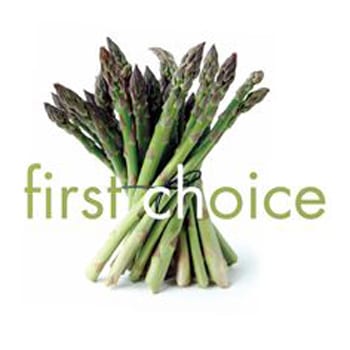University of West London’s Culinary Stars Shine at ‘Student Experience’ Event
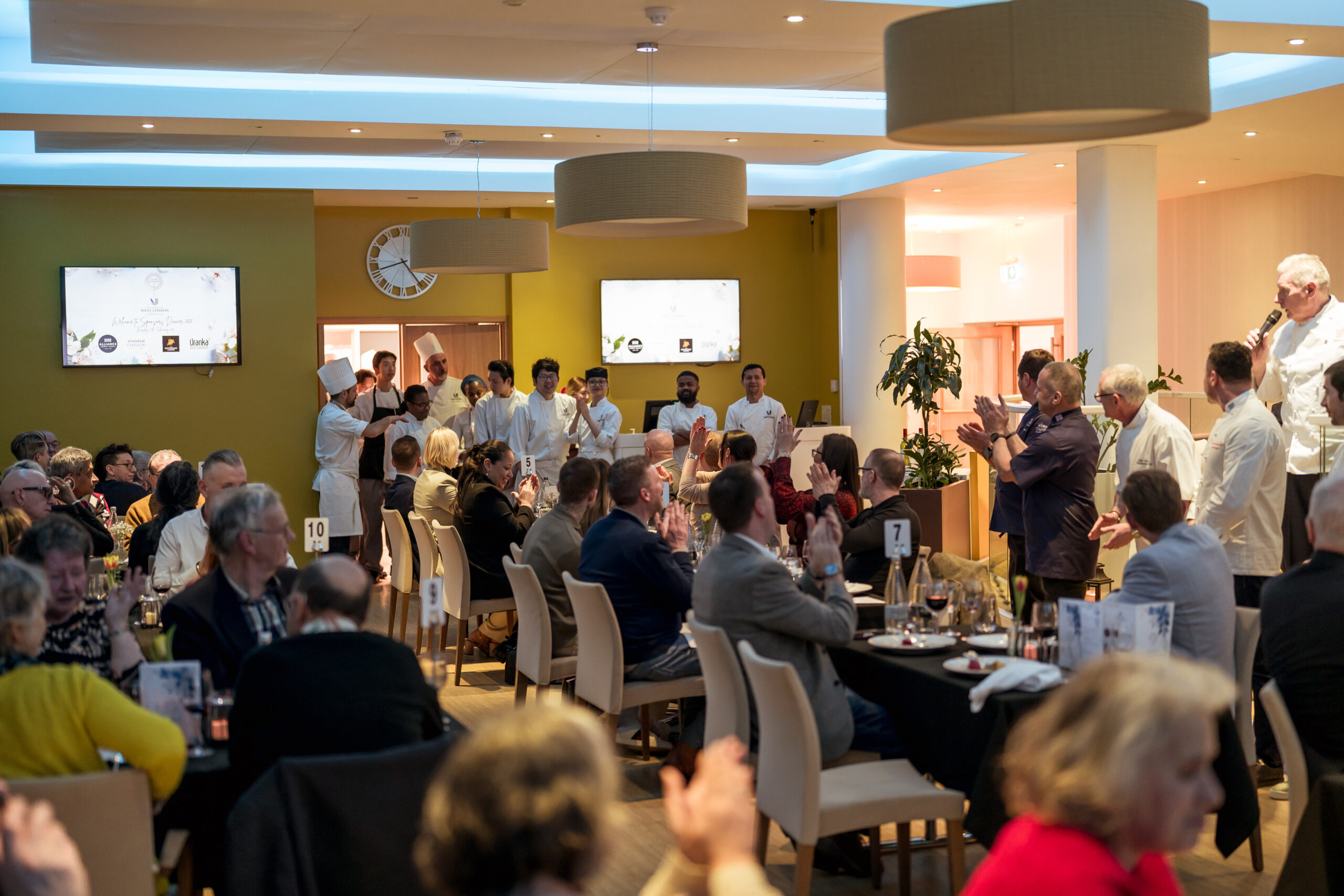 The University of West London (UWL) proudly hosted an unforgettable ‘Student Experience’ event at Pillars Restaurant on Thursday (27) February, showcasing the remarkable talent and creativity of its Culinary Arts degree students.
The University of West London (UWL) proudly hosted an unforgettable ‘Student Experience’ event at Pillars Restaurant on Thursday (27) February, showcasing the remarkable talent and creativity of its Culinary Arts degree students.
This inaugural Student Experience event, curated by University of West London Culinary Ambassador Michael Coaker, is crucial in providing a cornerstone for students’ training and development.
Chef Michael Coaker said
“This evening’s function provided invaluable, hands-on experience under the expert mentorship of top industry chefs and dedicated lecturers. We are so very grateful to all of our supporters and sponsors, including Alliance Farmers Produce, The Hippodrome Casino, Essential Cuisine and Oranka Juice Solutions.”
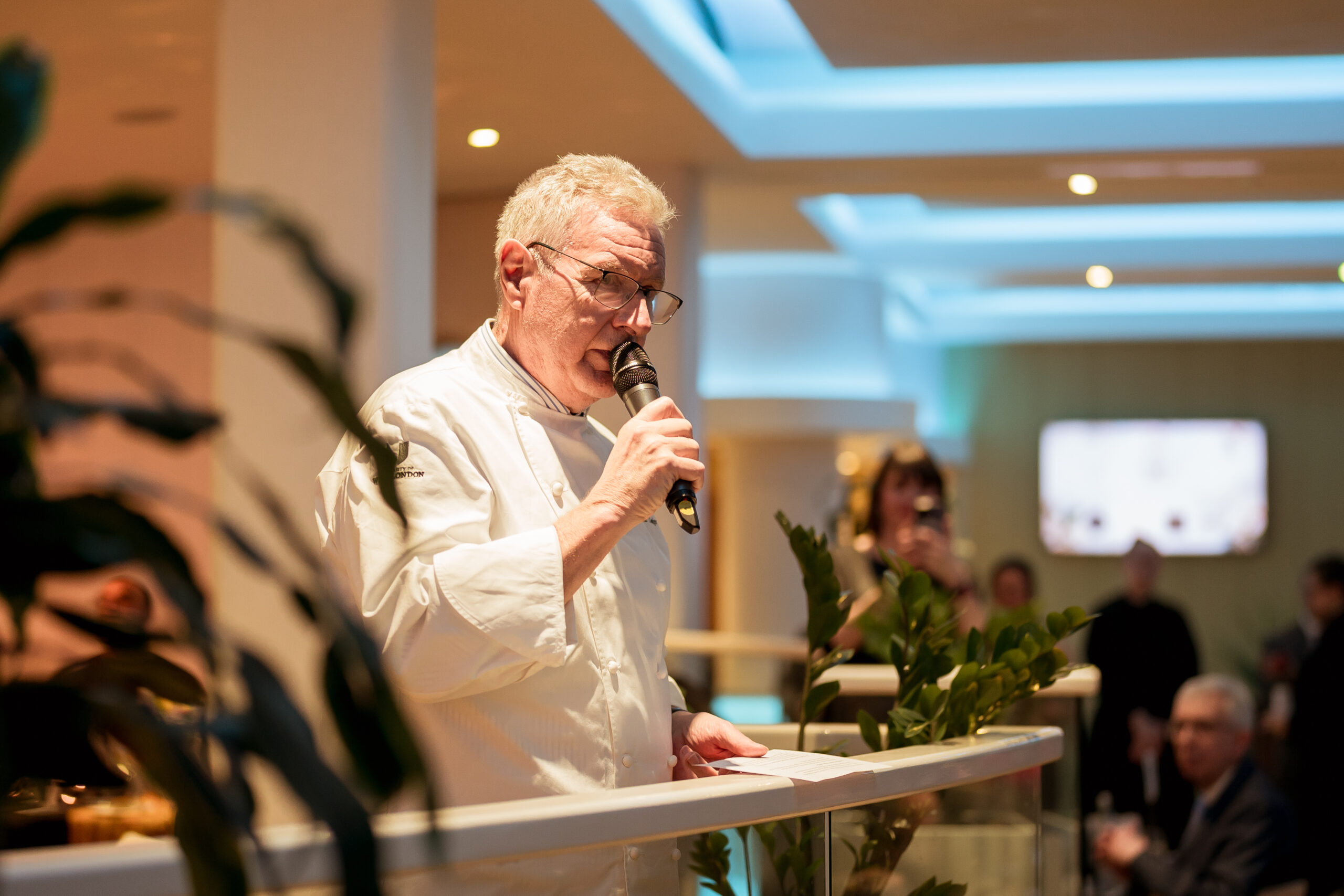 He continued,
He continued,
“The students have had a unique opportunity to refine their technical skills, experiment with new flavours, and master the art of high-end dining service in a real-world setting. The university continues to bridge the gap between academia and the industry by forging strong connections with top chefs and culinary professionals, ensuring that students are well-prepared for successful careers in hospitality.”
The evening was a resounding success. Students delivered an exquisite four-course menu and demonstrated their skill, innovation, and passion for fine dining, gastronomy and luxury hospitality, which are both specialisms in undergraduate and post graduate degree courses offered at the University of West London.
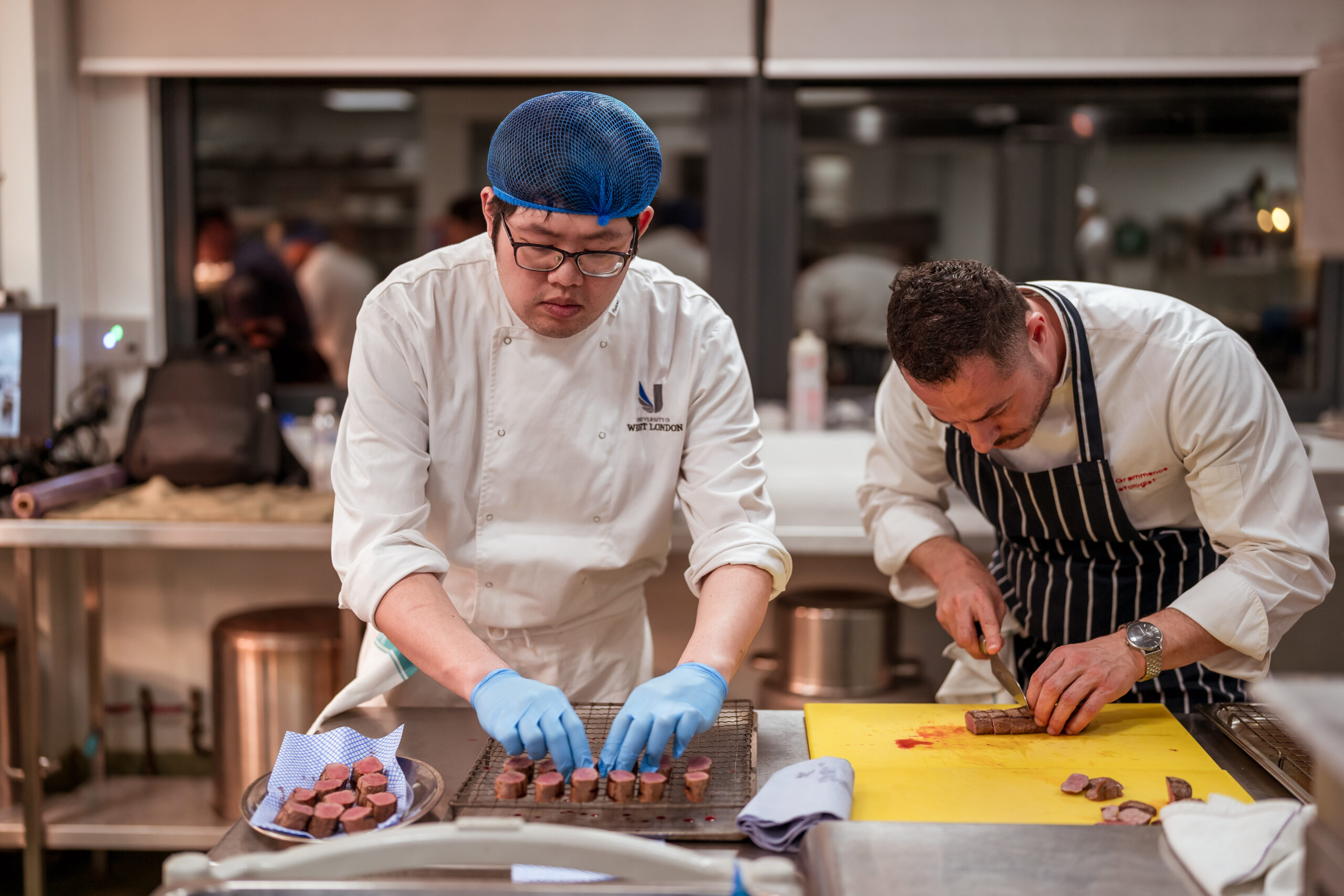 Guided by esteemed guest chefs and university lecturers, the students meticulously crafted and served a menu that delighted attendees with its bold flavours and refined presentation.
Guided by esteemed guest chefs and university lecturers, the students meticulously crafted and served a menu that delighted attendees with its bold flavours and refined presentation.
Professor Peter John, CBE, Vice Chancellor and President of The University of West London was delighted to host such a prestigious event, he said
“It was an absolute pleasure to meet all those who have mentored and supported our staff and students at the University. The evening was a genuine success, and we hope to repeat it in the months and years to come.”
An exquisite seasonal menu was created for 70 guests who attended:
Taster: Orkney scallops with celeriac & Cox’s apple purée, Scottish black pudding crumb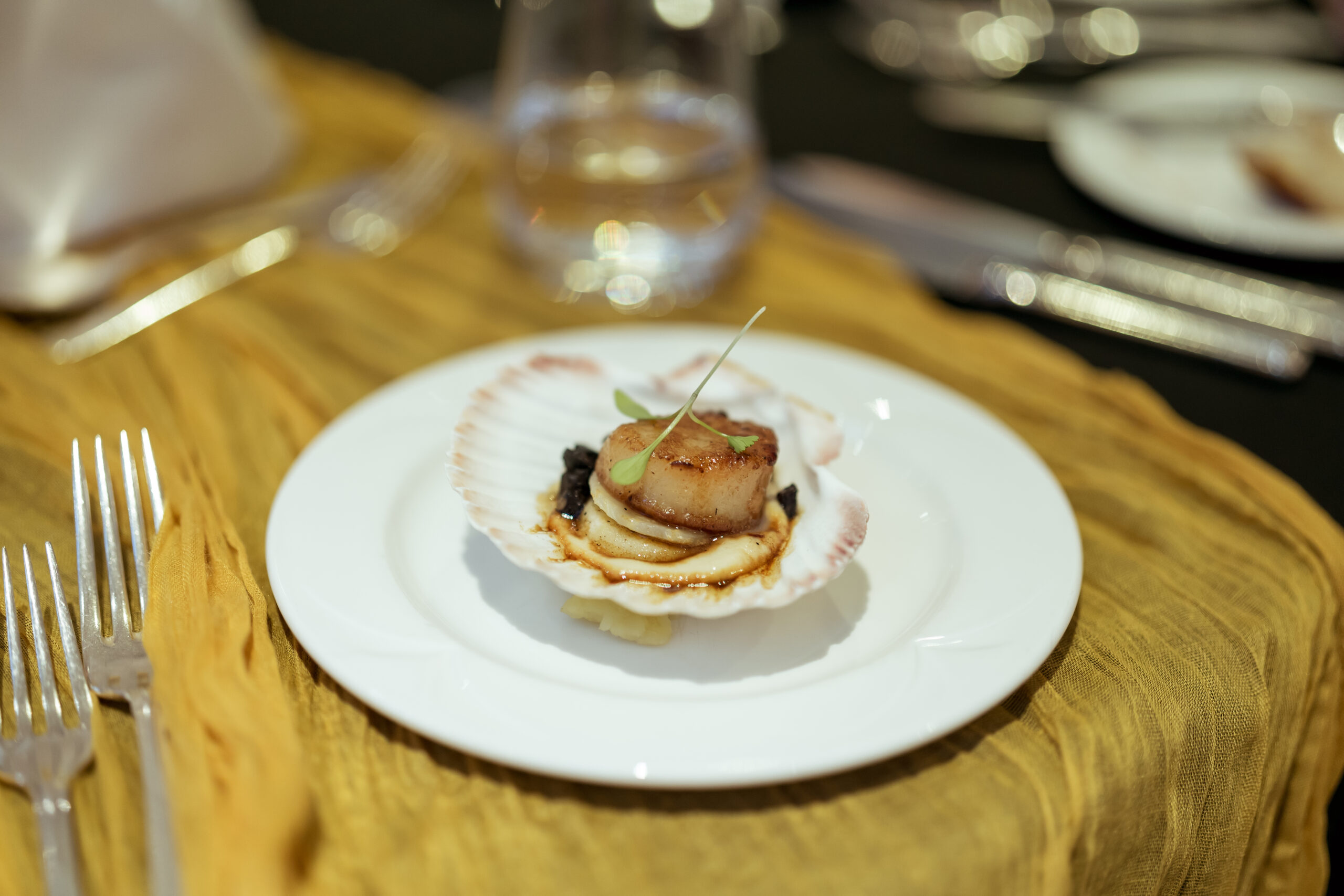
Starter: Roast Jerusalem artichoke, onion soubise with rainbow chard, cashew nut & Keralan spiced oil
Main Course: Asian “Lumina” Lamb loin, feta saffron mash, smoked aubergine & wild mushroom ragu, spiced red wine sauce
Dessert: Amalfi lemon tart “brûlée” with raspberry sorbet, limon & shiso cress
Front of House Lecturers, Giovanni Gargasole and Sabina Paval, headed-up the restaurant set-up and service, while Chef Lecturers Paulo Oliveira and Cristian Boglaru led the kitchen team.
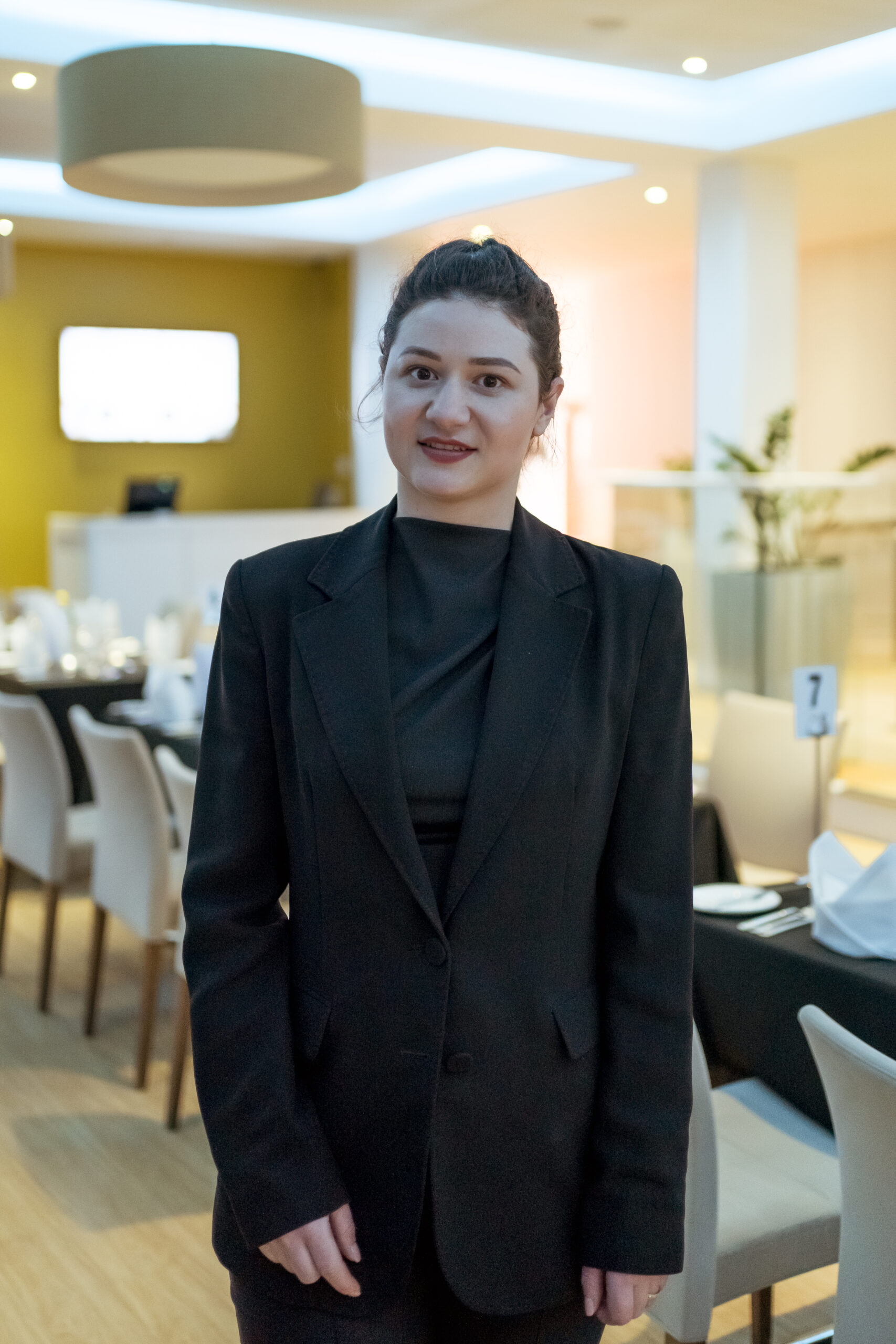 Sabina said
Sabina said
“Events like these are so important to showcase our wonderful restaurant and the talent of our chef lecturers and students. The students enjoy real-life service experiences within Pillars, and it is a fantastic opportunity for them to network and forge industry links and connections before graduation.”
Their invaluable guidance gave students first-hand insight into the fast-paced and demanding world of professional gastronomy. The ‘Student Experience’ event is central to UWL’s commitment to practical learning.
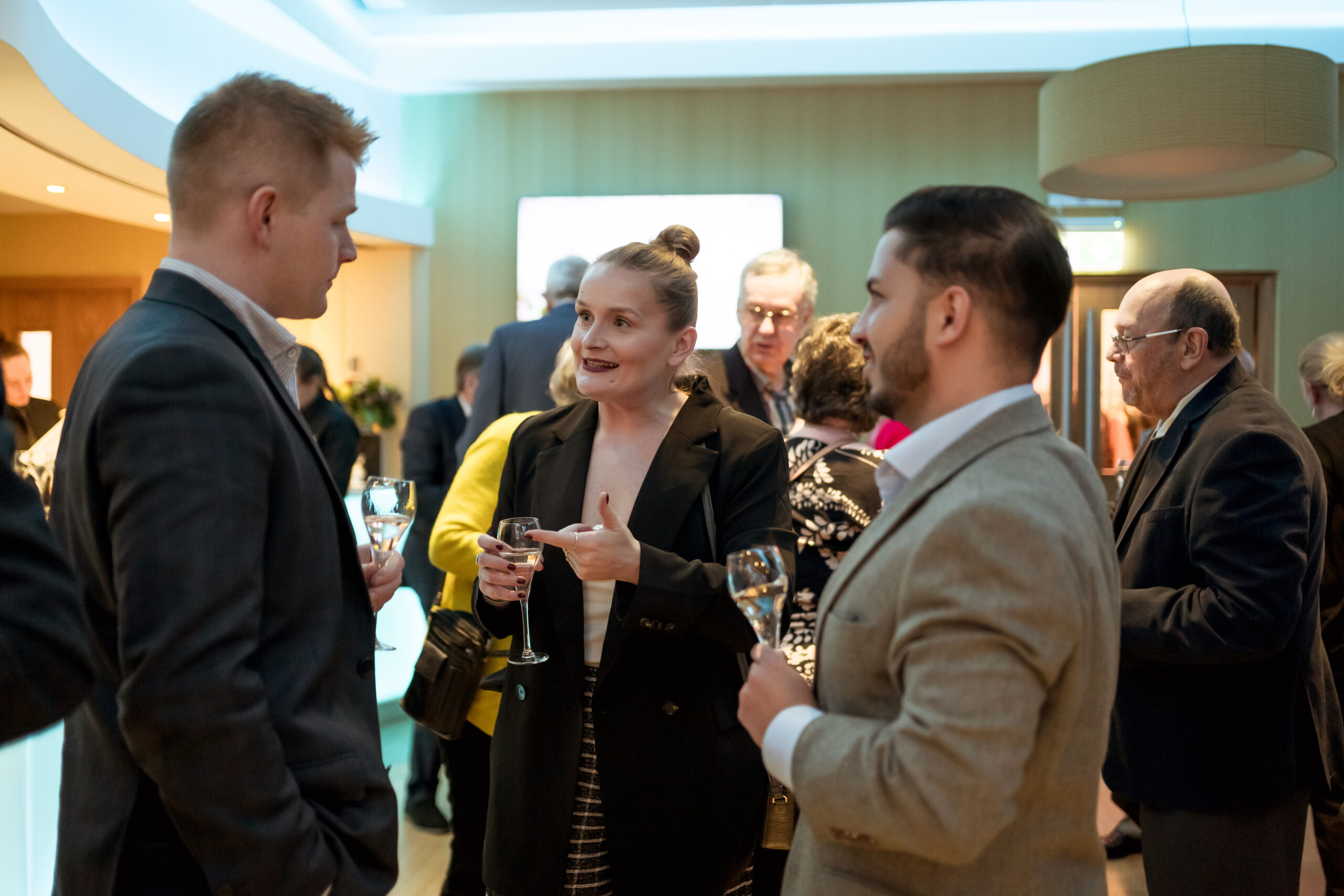 Guests, including industry professionals, university stakeholders, and sponsors, were very impressed by the students’ remarkable ability to execute a sophisticated fine-dining experience. The evening celebrated culinary excellence and reinforced the importance of experiential learning in shaping the next generation of talented chefs.
Guests, including industry professionals, university stakeholders, and sponsors, were very impressed by the students’ remarkable ability to execute a sophisticated fine-dining experience. The evening celebrated culinary excellence and reinforced the importance of experiential learning in shaping the next generation of talented chefs.
As the University of West London continues to live up to its excellent reputation of developing future leaders in the culinary arts, experiences like these remain integral to the students’ journey towards achieving culinary excellence, dedicated to showcasing their creativity, dedication, and passion for gastronomy.
For more information about upcoming events and the wide range of culinary and food degree programs at UWL, please visit www.uwl.ac.uk
Ready, Steady, Cooks&Co!
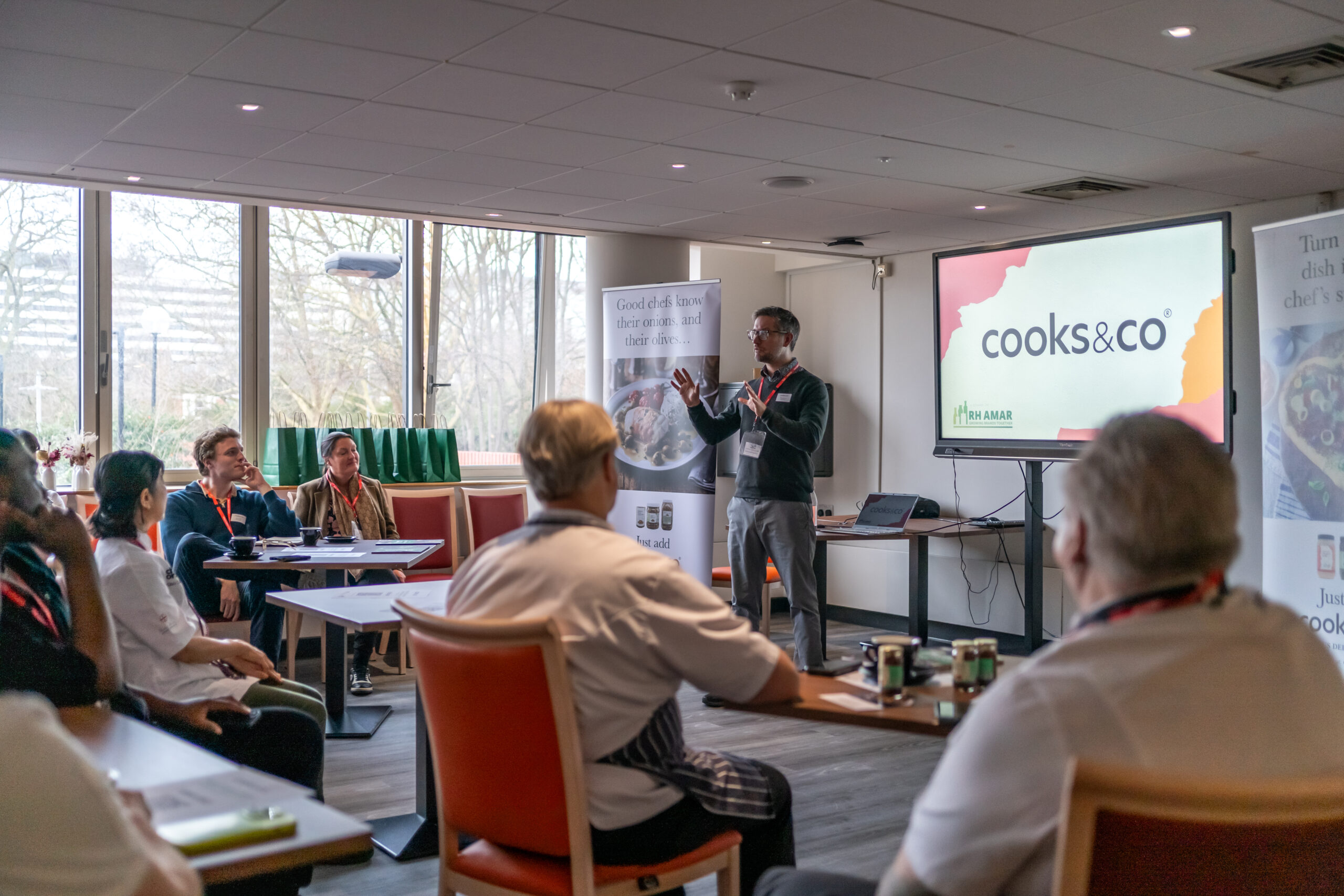 Exclusive Cooks & Co Menu Development Day at West London College
Exclusive Cooks & Co Menu Development Day at West London College
West London College hosted an exciting and interactive menu development day in collaboration with RH Amar and Cooks & Co, bringing together top chefs, students, and food industry professionals for an inspiring day of culinary creativity. At The Chefs’ Forum Academy, this exclusive workshop spotlighted premium ingredients from the Cooks & Co range, including Anchovies, Porcini Mushrooms, Artichoke Hearts, and Red Pesto.
This unique event saw 12 leading chefs working alongside hospitality students as part of ‘Careers Week,’ giving them valuable insight into the world of food marketing management and menu development. The hands-on experience will allowed students to develop their skills and explore career pathways in the culinary industry.
Pete Johnson, Brand Consultant at RH Amar commented,
“Today was our first step in planning how to reset the Cooks&Co brand and to connect with more Chefs and foodservice professionals. We were here to fact find, to learn how to inspire and to learn to speak their language! We aim to be the ‘quiet hero’ of professional kitchens. Big thanks go to The Chefs’ Forum for connecting us with West London College and such a fantastic brigade of talented chefs.”
A Ready Steady Cook-Style Challenge!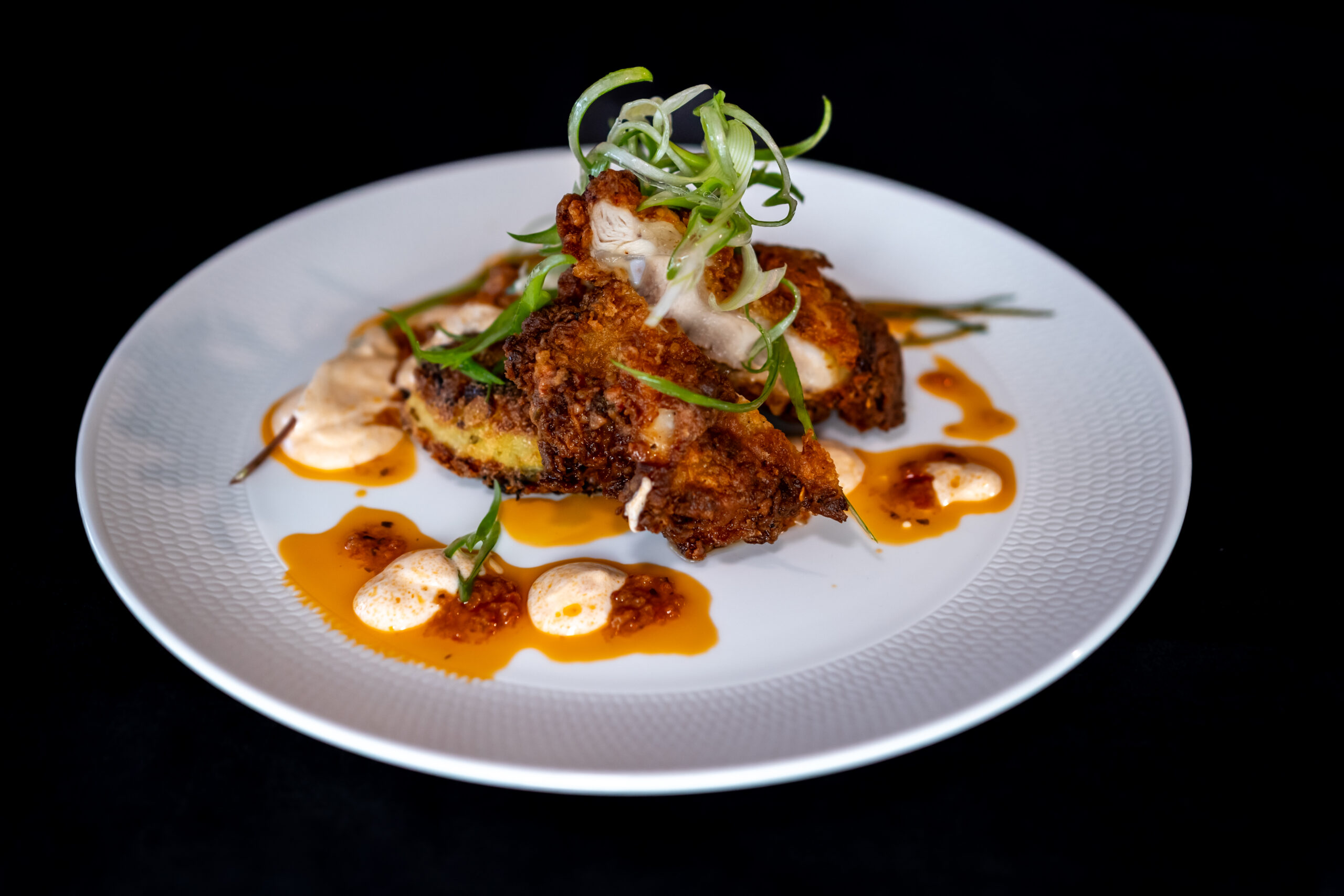
One of the event’s highlights was an exhilarating ‘Ready Steady Cook’ style challenge, where the chefs crafted 12 innovative dishes using a specially curated selection of Cooks & Co ingredients alongside a variety of seasonal produce. From fish and meat to vegetables, rice, and pasta, the chefs will have to think on their feet and create restaurant-quality plates in just one hour.
The Cooks&Co Creations produced:
Rob Grist, Exec Chef, South Place
Anchovy, Pan Confit Tomato, Wild Garlic Pesto, Pine Nut
Jeffrey Gonzales, Chef Lecturer, West London College
Deconstructed Asian Porcini Mushrooms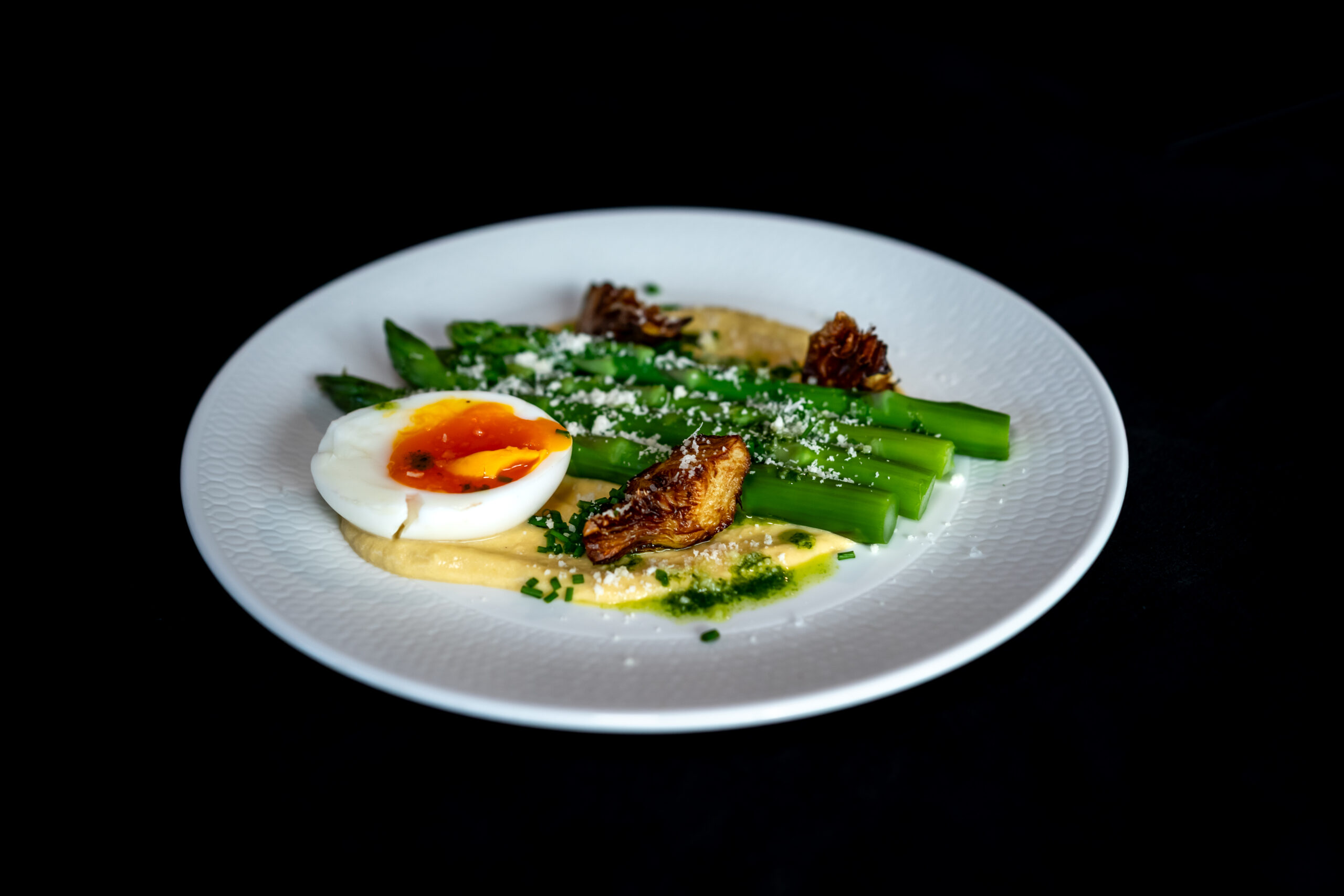
Graham Green, Chef Patron, Green Herring Catering Co
Buttermilk and Pesto Chicken
Keiko Urakawa, Head Chef at Café Bar Necco
Artichoke Kushi Katsu (Breaded and Deep Fried Artichoke Hearts)
Patrice St Yves, Chef Patron, Le Gobble
Grilled Asparagus, Porcini Praline, Citrus Sabayon
Rafael Ferreira Cardoso, Head Chef, BaxterStorey
Pearl Barley Red Pesto Risotto with Braised Chicken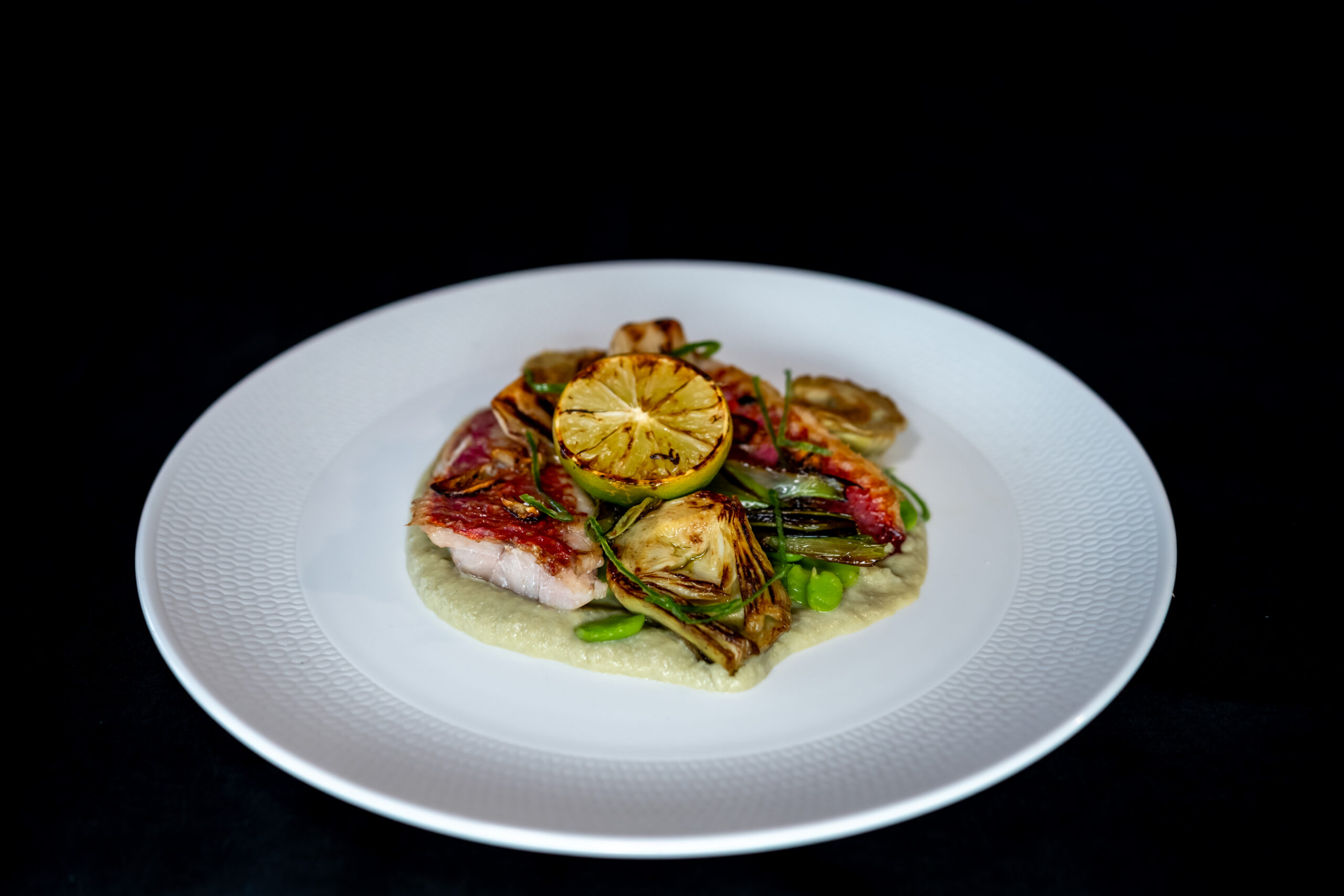
Daniele Ciniglio, Sous Chef, Royal Garden Hotel
Porcini Risotto
Aline Quina, Chef Patron, Filo
Grilled Red Mullet with Artichoke Two Ways, Edamame Beans & Lime
Alan Bird, Chef Consultant, Chef Alan Bird Consultancy
Pissaladerie
Sabah Shukur, Level 3 Student, West London College
Creamy Artichoke Tagliatelle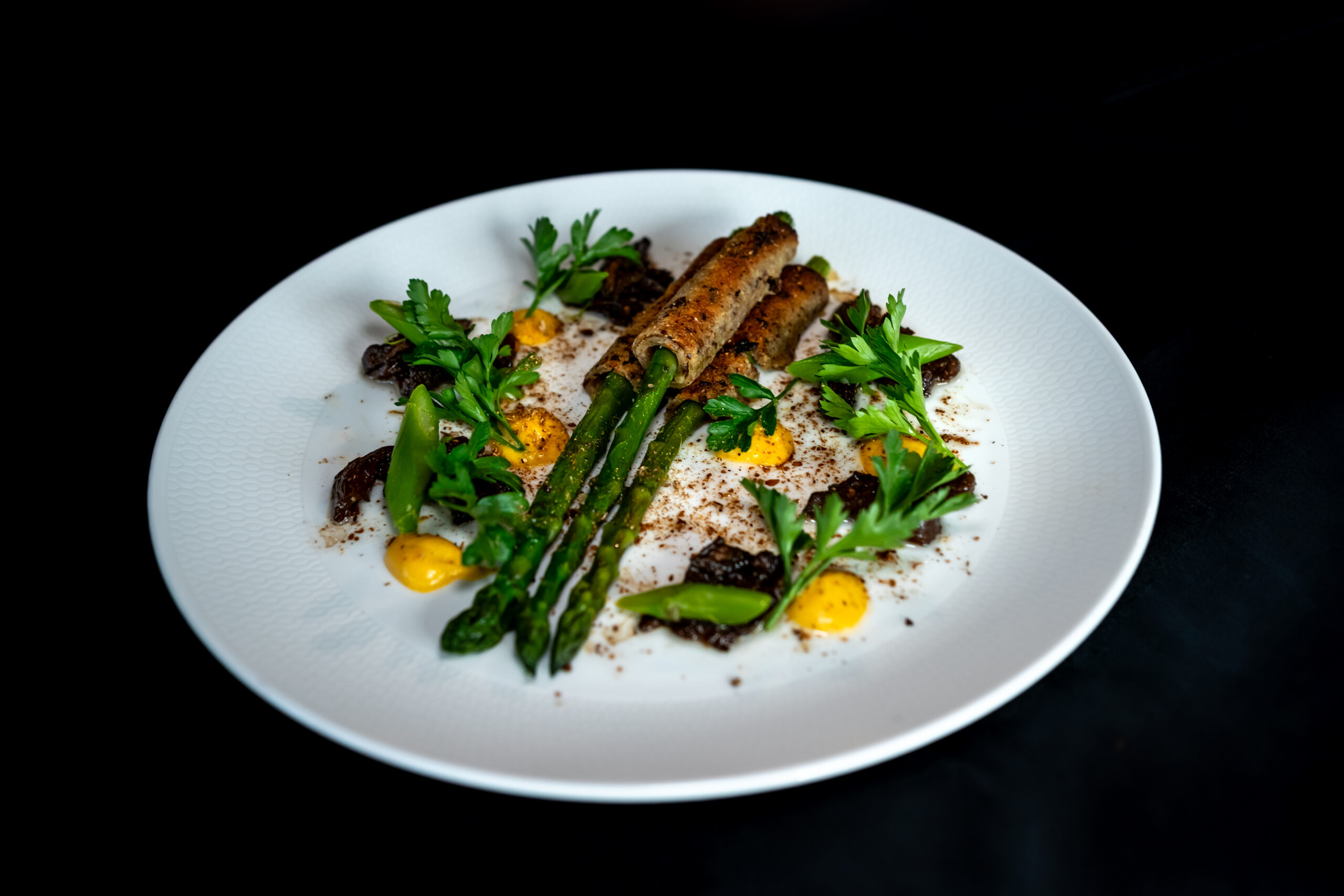
Bob Carruthers, Chef Lecturer, West London College
Pissaladerie
Jahmi Freeman Wright, Chef de Partie, Corinthia
Pan Fried Cod with Mushroom Sundried Tomato Pesto Sauce and Chilli Garlic Spinach
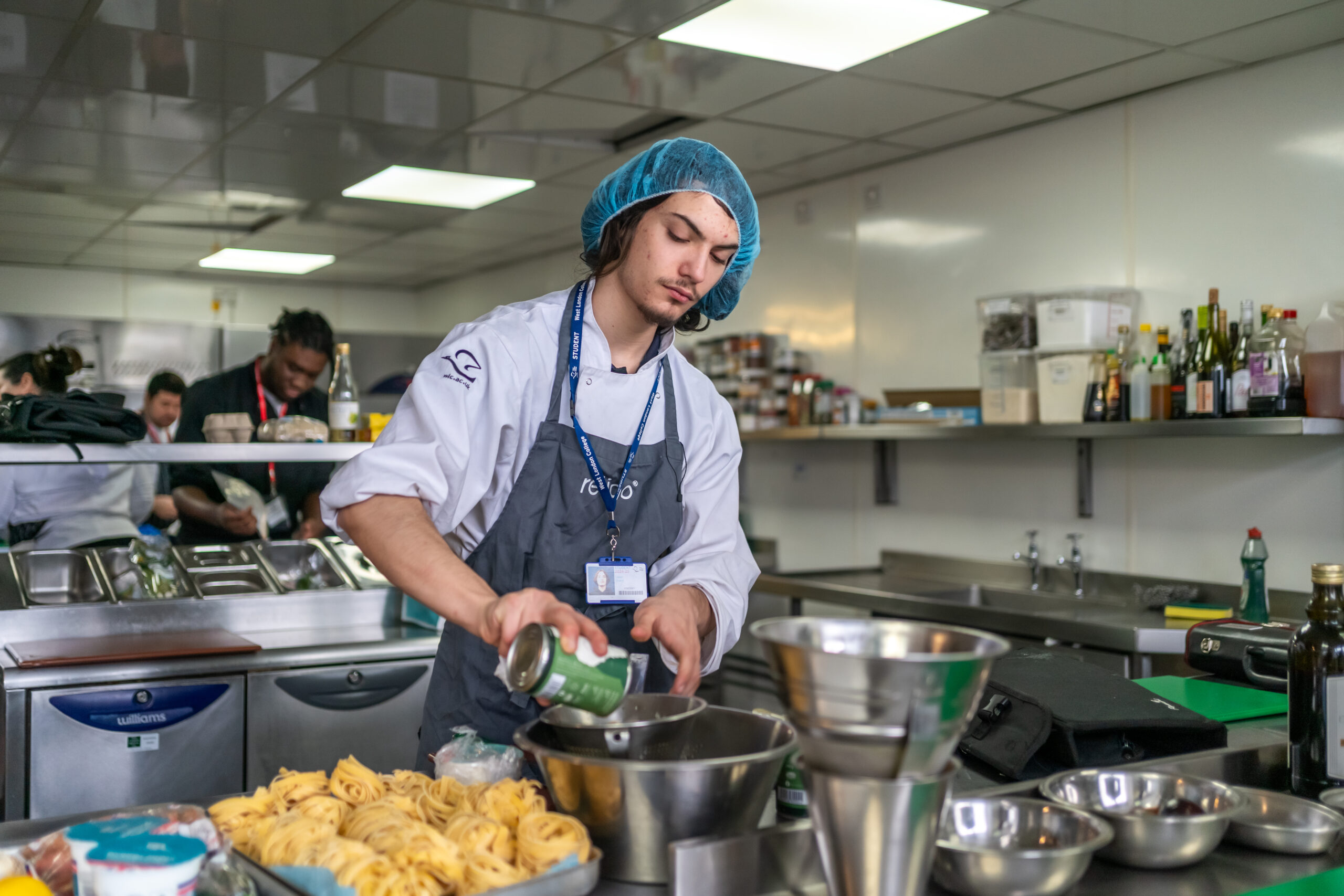 Level 3 Student Sabah Shukur cooked a delicious dish of Creamy parmesan artichoke tagliatelle with white truffle oil and basil, he said
Level 3 Student Sabah Shukur cooked a delicious dish of Creamy parmesan artichoke tagliatelle with white truffle oil and basil, he said
“I have had a brilliant time working with Cooks&Co ingredients today and it also allowed me to practice producing dishes in a competition environment. I chose to cook with Cooks&Co artichoke hearts as they have a lovely creamy texture, and it is also not found in everyday dishes, which makes them unique and delicious from my point of view. I have really enjoyed meeting the guest chefs, too, and seeing and tasting all the wonderful dishes produced today.”
Each chef received an advance list of available ingredients and the star products from the Cooks&Co range, allowing them to plan their approach. The final dishes were photographed for future use, capturing the innovation and expertise behind each creation.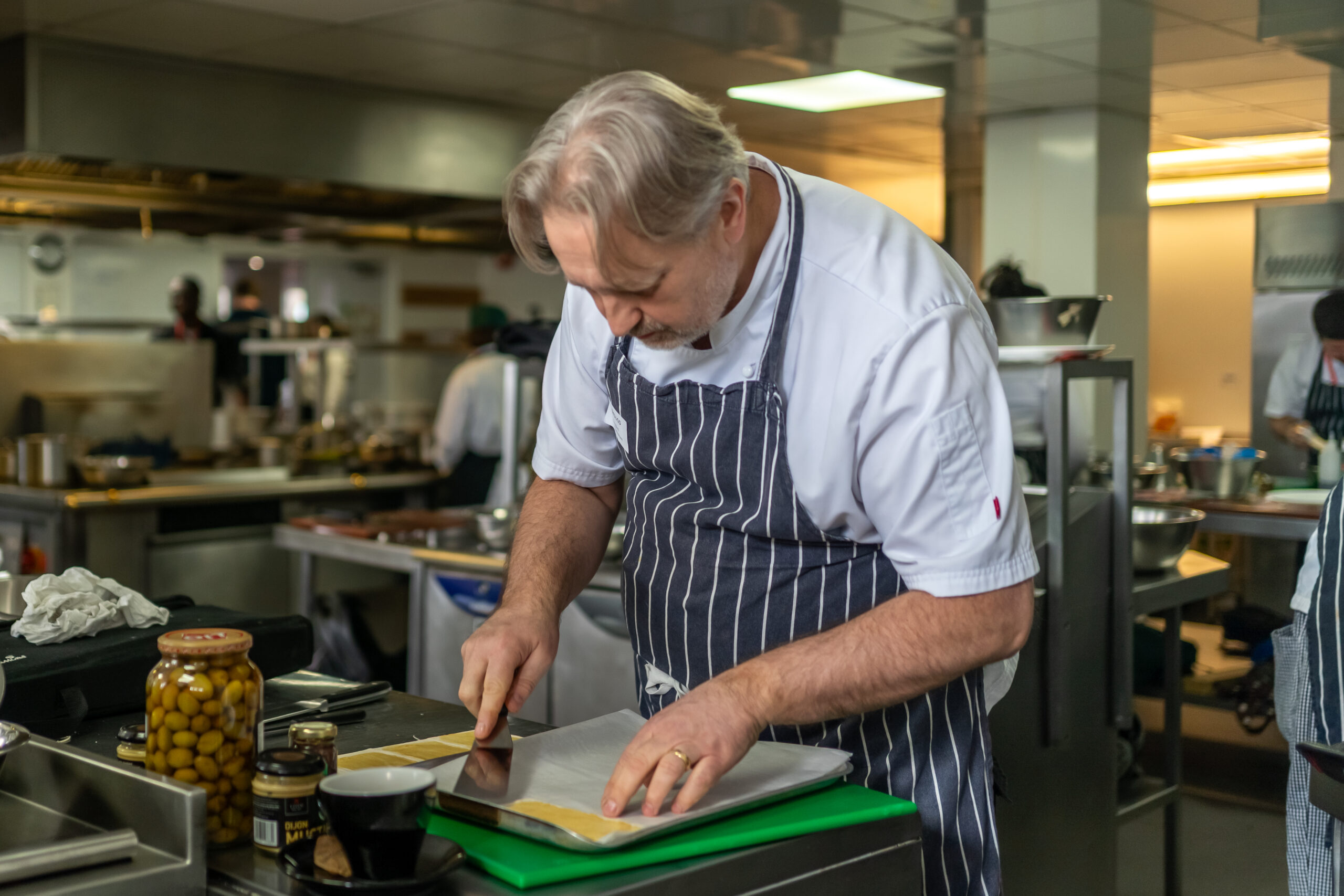
Additionally, a series of ‘Chef Hacks’ will be filmed and shared on social media by RH Amar in the coming weeks, offering tips and insights to inspire fellow chefs and food lovers.
Insights and Feedback
As part of the development process, the event featured a focus group element, where the participating chefs provided valuable feedback on the products and their application in professional kitchens. This feedback was gathered through a survey accessed via QR code, ensuring a seamless and interactive way to capture opinions. The results will then be compiled into an art worked report, providing insights and suggestions for future product innovation and menu development.
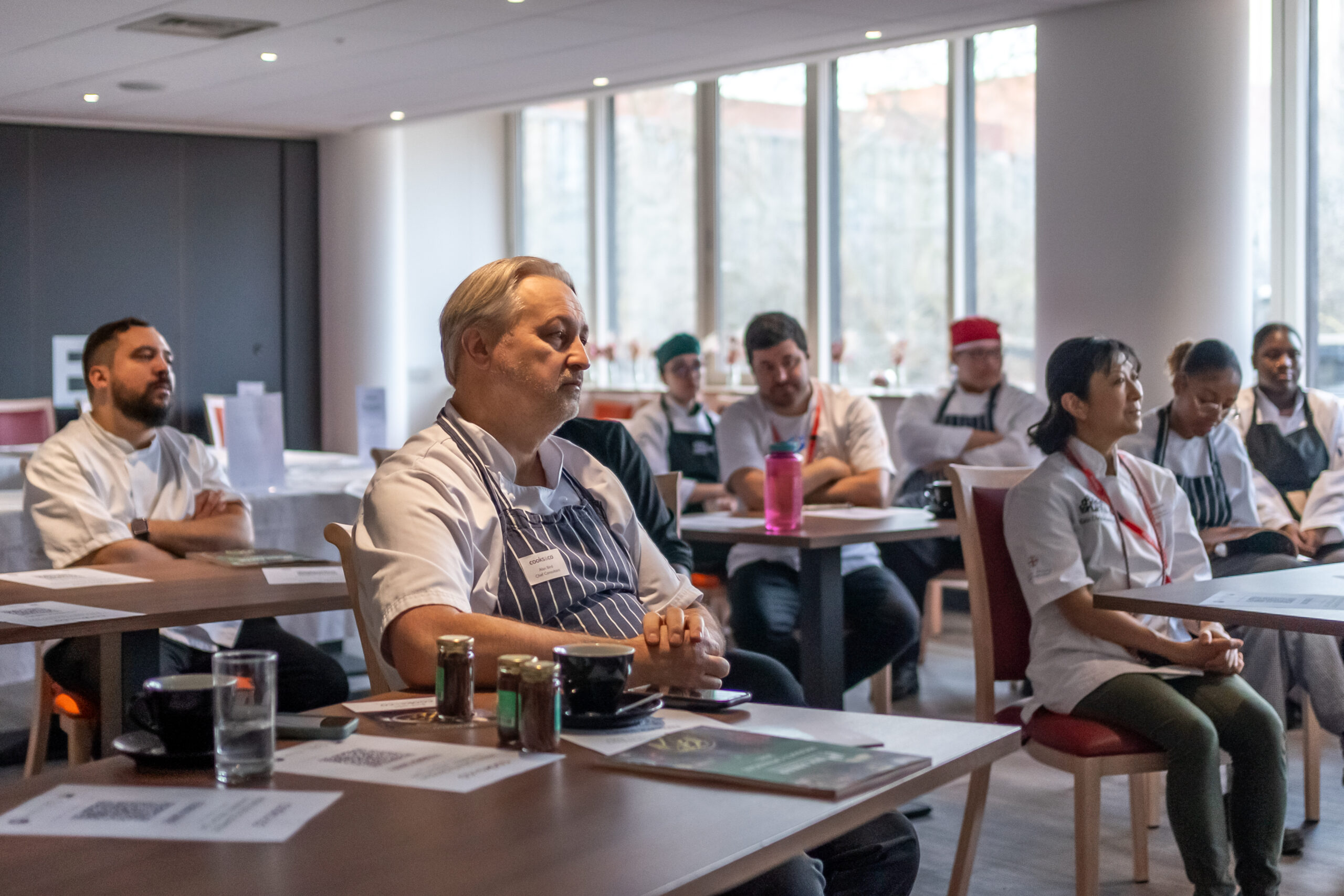 A Collaboration of Culinary Excellence
A Collaboration of Culinary Excellence
This event is a fantastic opportunity for aspiring chefs and hospitality students to engage with industry professionals, gain real-world experience, and enhance their understanding of menu development and ingredient application. Hosted by an experienced chef lecturer, the workshop will not only celebrate the versatility of Cooks&Co ingredients but also encourage creative thinking and culinary innovation.
By bringing together education and industry expertise, the Cooks&Co Menu Development Day was an inspiring and informative event, reinforcing West London College’s commitment to nurturing the next generation of culinary talent.
Stay tuned for exclusive highlights and behind-the-scenes content from this extraordinary day of food innovation – Yes, we filmed EVERYTHING!
Chef of the Week: John Serhal, Executive Chef at The Royal Garden Hotel in London
How long have you worked at your current restaurant?
3 years, since the reopening of the hotel.
Where did your passion for cooking come from and where did you learn your skills?
My passion came from my father, who was a chef. My first job was as kitchen porter in his restaurant. I was an apprentice at The Langham, but as a chef you never stop learning or improving your skills.
What do you enjoy most about being a chef?
The camaraderie in the kitchen, we have a large brigade at the Royal Garden Hotel. Also, as a chef, I’ve had the opportunity to work in many different countries.
Name three ingredients you couldn’t cook without.
Salt, butter, love and passion. You can taste when a dish is cooked with love and passion.
Which piece of kitchen equipment couldn’t you live without?
Thermomix.
What food trends are you spotting at the moment?
Simpler food that is easier to work with, due to a lack of chefs.
What do you think is a common mistake that lets chefs down?
Chefs that don’t taste their food enough when they’re cooking. The old adage of running before you can walk.
What is your favourite time of year for food, and why?
Spring, mainly for the lamb, although October for mushrooms is a close second.
Which of your dishes are you most proud of?
Not any one dish, but the origin menu is a collective effort from the whole team and that’s the thing I’m the most proud of.
How do you come up with new dishes?
Normally as a team we pick the main ingredients (fish, meat, vegetables depending on the season etc) and then work through the dishes as a team until we are all happy with the end result.
Who was your greatest influence?
First my dad, after that all the chefs who I’ve worked with in the past 30 years.
Tell us three chefs you admire.
Anyone who does this job well, it’s not an easy career but extremely rewarding if you put your heart into what you’re doing.
What is your favourite cookbook?
Still has to be White Heat.
Who do you think are the chefs to watch over the next few months?
Anyone who manages to stay open as it looks like a bad start to the year for restaurants.
What’s been your favourite new restaurant opening of the last year?
The only place I’ve been to so far this year is Brooklands so it will have to be that!
A Rather Palatial London Lunch at The Royal Garden Hotel
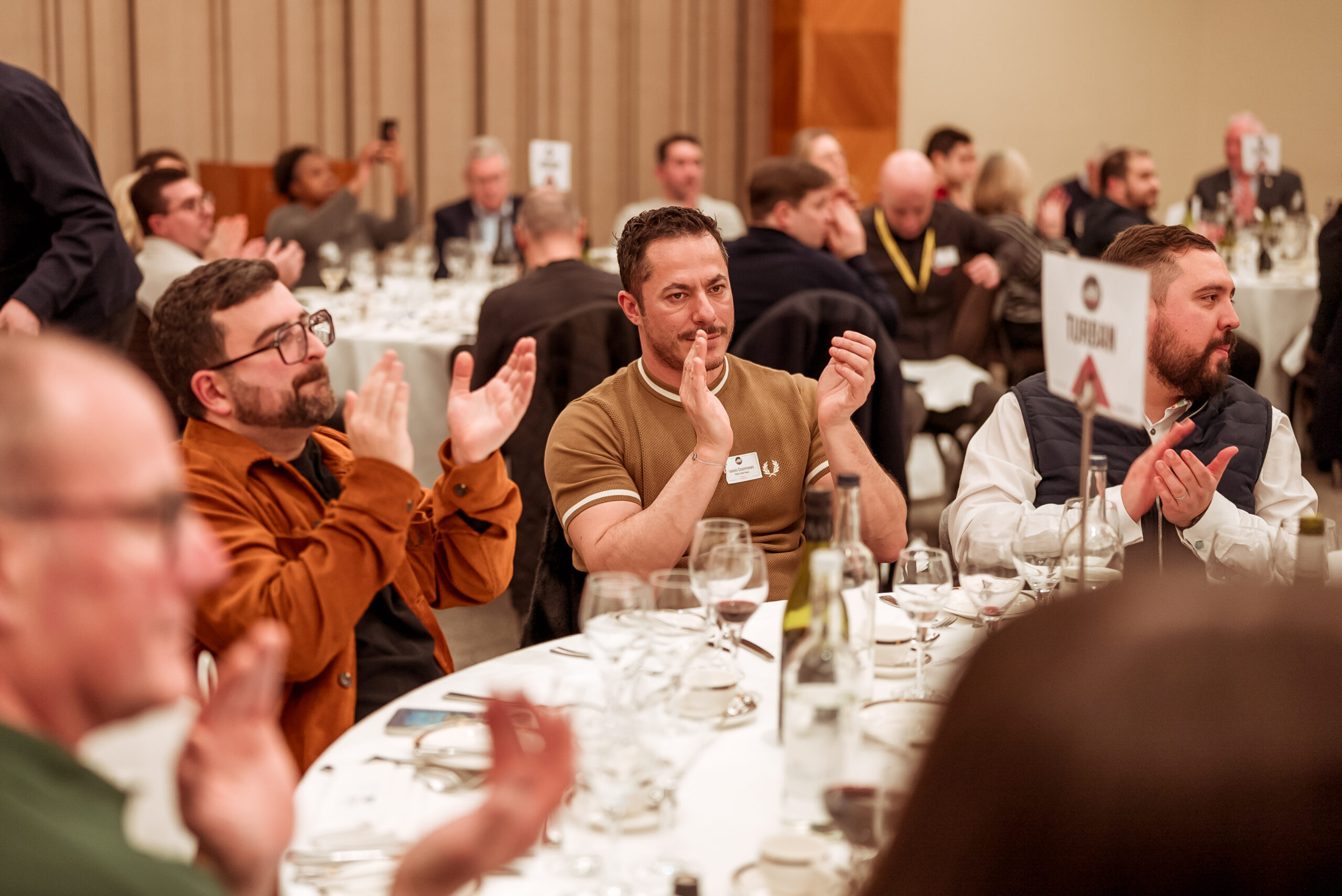 Royal Garden Hotel joined forces with students from West London College for a unique event celebrating the London hospitality scene and offering the next generation a taste of working large banquets in a five-star luxury hotel.
Royal Garden Hotel joined forces with students from West London College for a unique event celebrating the London hospitality scene and offering the next generation a taste of working large banquets in a five-star luxury hotel.
Over 20 students from West London College participated in the event, producing a four-course lunch served to 100 guests. They cooked alongside Royal Garden Hotel’s Executive Head Chef, John Serhal, Head Chef, Connor Godfrey, TV regular Dipna Anand, Norma’s Santo Pate and Group Pastry Chef for Baxter Story, Rebecca Marshman.
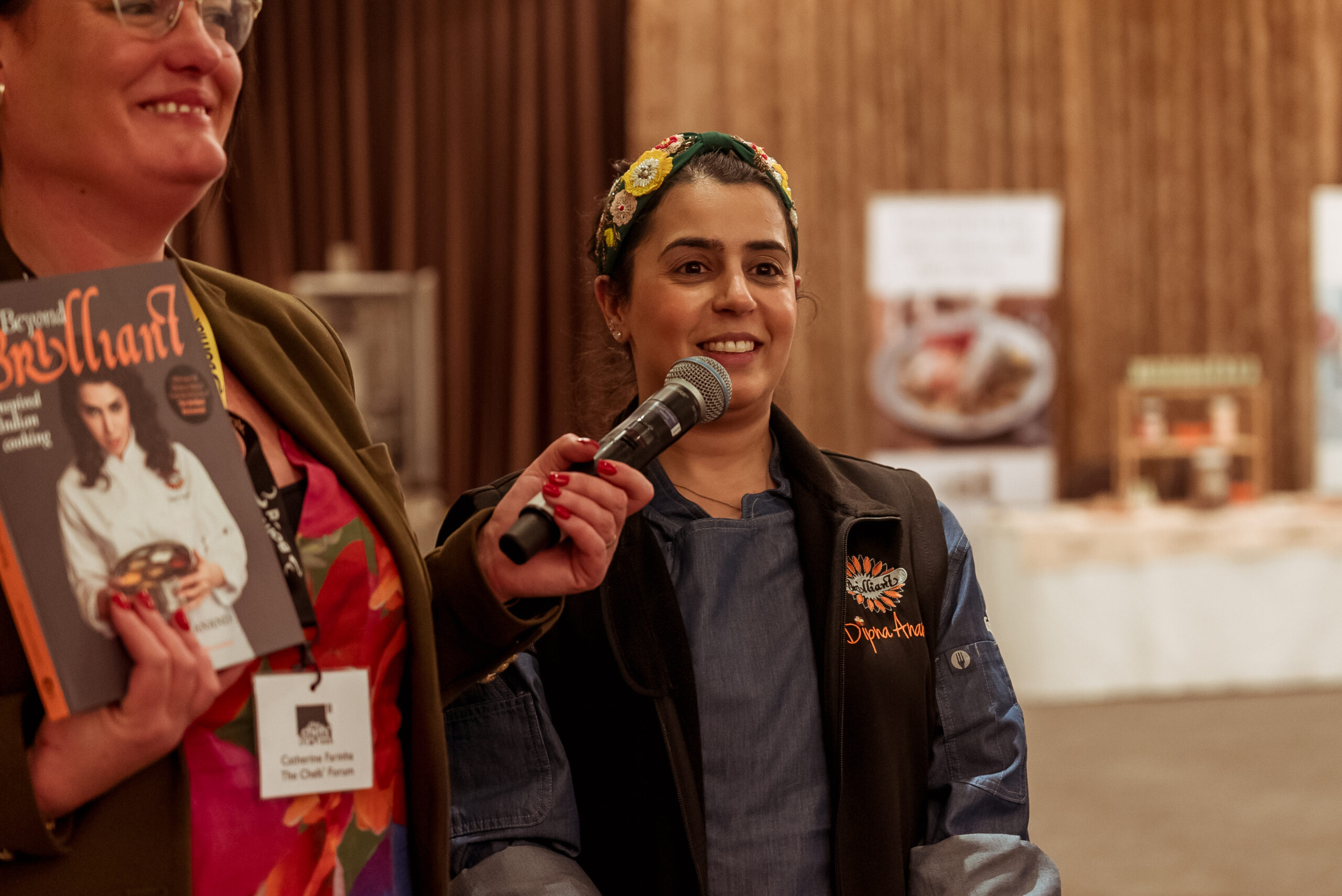 The event, hosted by The Chefs’ Forum, which connects top UK culinary talent with colleges to inspire young chefs, celebrated the second print run of The Chefs’ Knowledge —a book designed to help budding chefs learn essential skills and recipes at the start of their careers.
The event, hosted by The Chefs’ Forum, which connects top UK culinary talent with colleges to inspire young chefs, celebrated the second print run of The Chefs’ Knowledge —a book designed to help budding chefs learn essential skills and recipes at the start of their careers.
Each chef was asked to choose a ‘Star of the Day’ and each ‘Star’ received either a copy of The Chefs’ Knowledge or a signed copy of Dipna’s new book Dipliciously Brilliant.
Dipna said
“It was so lovely to work with the students today, and Gwen was a real standout for me. She helped me create my dish effortlessly and executed every element with care and perfection. I am looking forward to welcoming he to my new Indian Gastro pub, Brilliant Gastro by Dipna that is set to open at the beginning of April.”
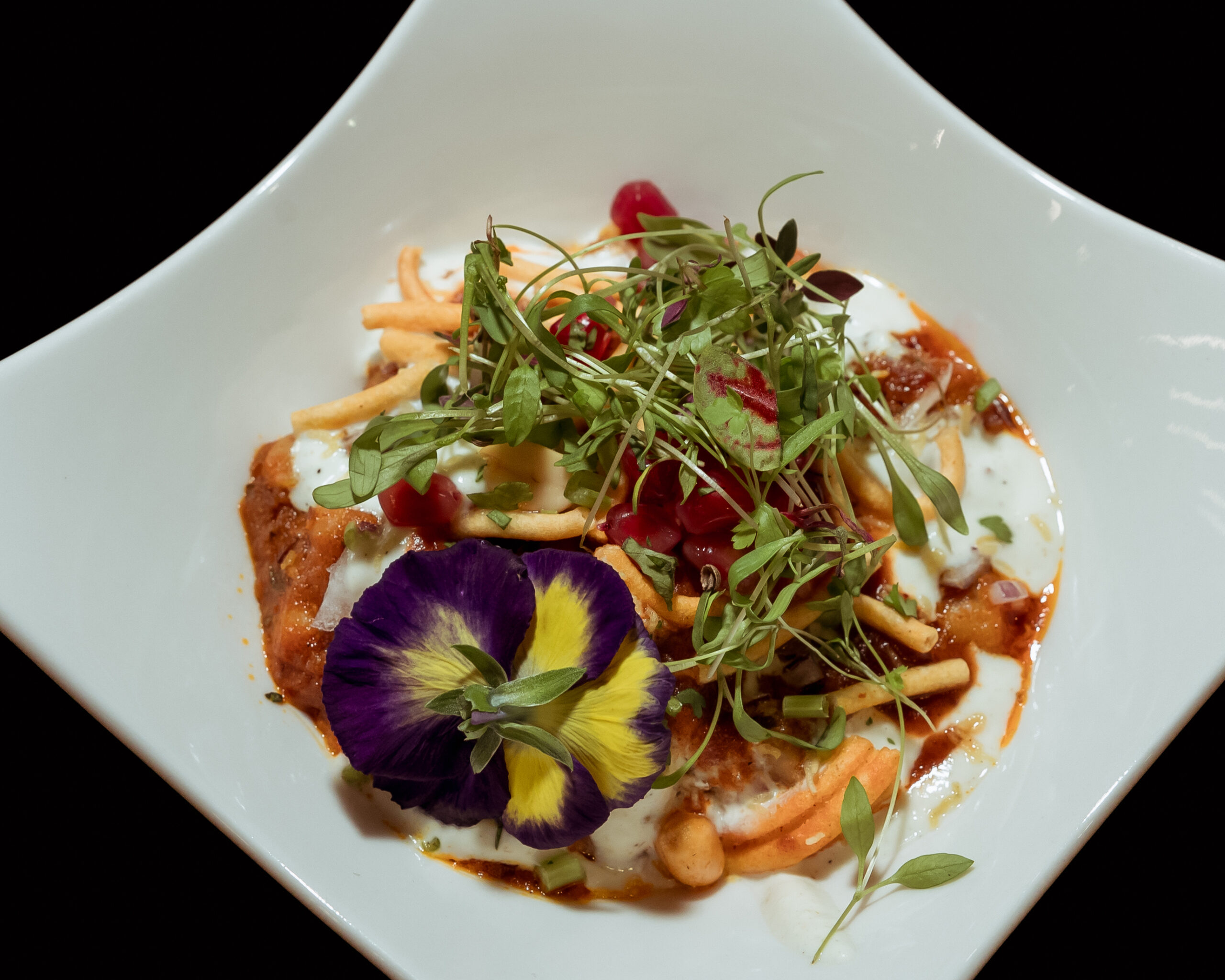 Some students worked as part of the front-of-house team, while others cooked the following exquisite menu:
Some students worked as part of the front-of-house team, while others cooked the following exquisite menu:
Starter – Dipna Anand – Chef Patron (Brilliant Restaurant)
Aloo tikki chaat blast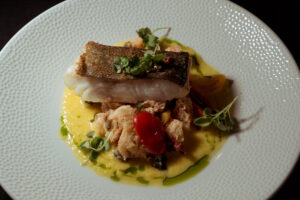
Fish Course – Santo Pate – Head Chef (Norma)
Skrei cod, panzanella salad, spicy yellow tomato coulis
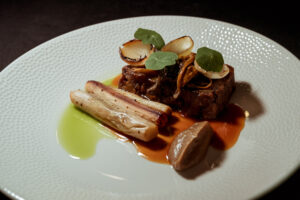 Main Course – John Serhal, Executive Chef & Connor Godfrey, Executive Sous Chef (Royal Garden Hotel)
Main Course – John Serhal, Executive Chef & Connor Godfrey, Executive Sous Chef (Royal Garden Hotel)
Braised Aussie rib of beef with wild mushrooms, salsify, artichoke, onion, jus
Dessert – Rebecca Marshman, Group Pastry Chef (BaxterStorey)
Rhubarb and custard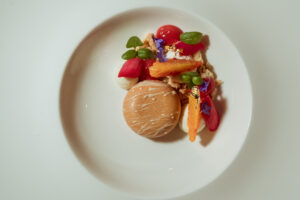
Coffee and Petit Fours – Rebecca Marshman, Group Pastry Chef (BaxterStorey)
Caramelised sea salt fudge and cherry and peanut butter chocolate pops
Ingredients were sponsored by Aussie Beef & Lamb, First Choice Produce, and Direct Seafoods London. Wines were sponsored by Brown Brothers.
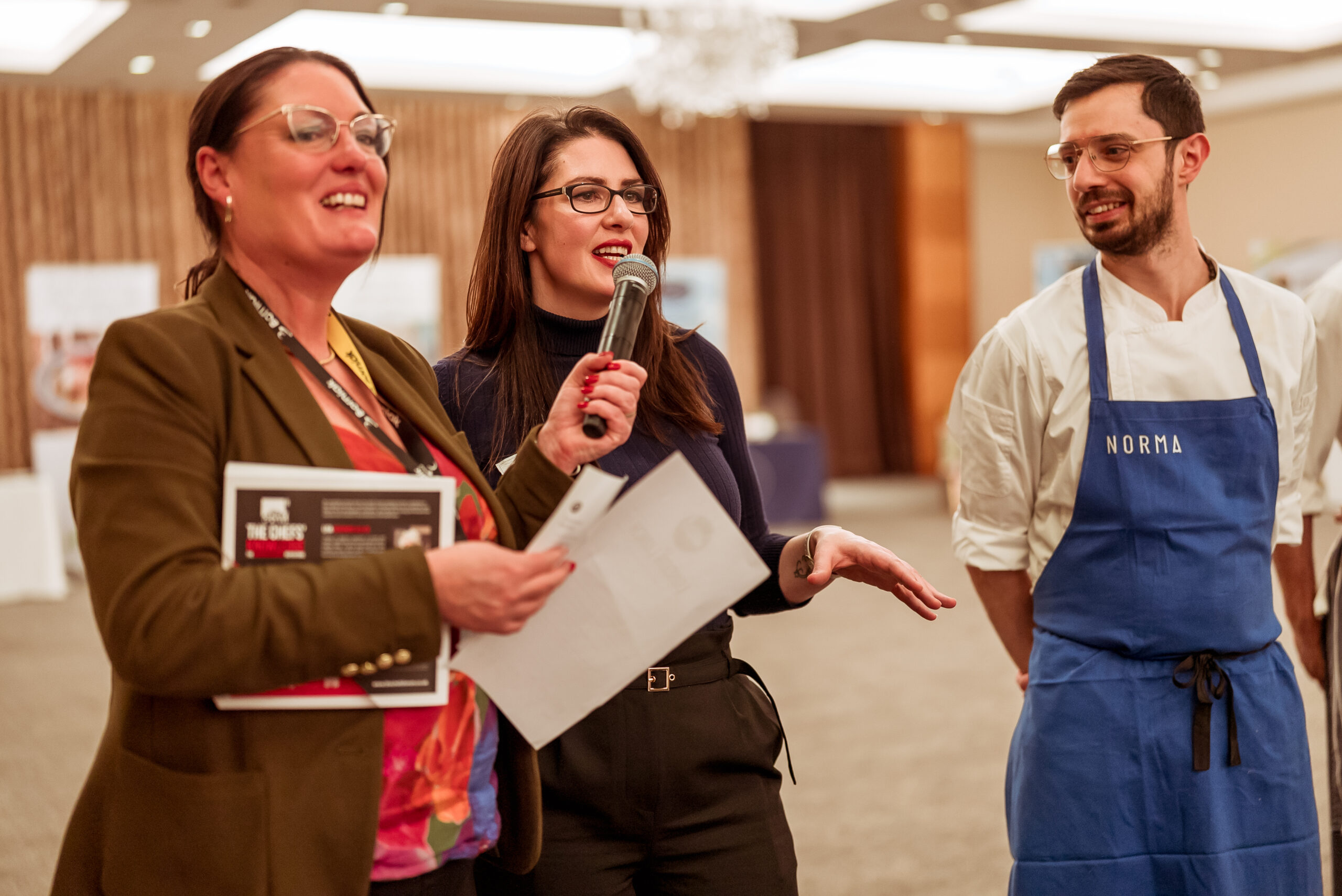 Santo Pate, Head Chef at Norma Restaurant, cooked a beautiful fish course, showcasing Skrei Cod, which is now in season, supplied by Direct Seafoods London. Business Unit Director, Sinead Murphy-Todd explained “I always look forward to Skrei cod coming into season from January to April each year and its great to be showcasing it here today. Skrei, pronounced ‘Sk-rey’, means ‘to migrate’, and at the beginning of each year, millions of large, mature cod make the journey back to where they were born. Chefs love Skrei cod as the meat is lean and has a delicate, fresh, clean taste.”
Santo Pate, Head Chef at Norma Restaurant, cooked a beautiful fish course, showcasing Skrei Cod, which is now in season, supplied by Direct Seafoods London. Business Unit Director, Sinead Murphy-Todd explained “I always look forward to Skrei cod coming into season from January to April each year and its great to be showcasing it here today. Skrei, pronounced ‘Sk-rey’, means ‘to migrate’, and at the beginning of each year, millions of large, mature cod make the journey back to where they were born. Chefs love Skrei cod as the meat is lean and has a delicate, fresh, clean taste.”
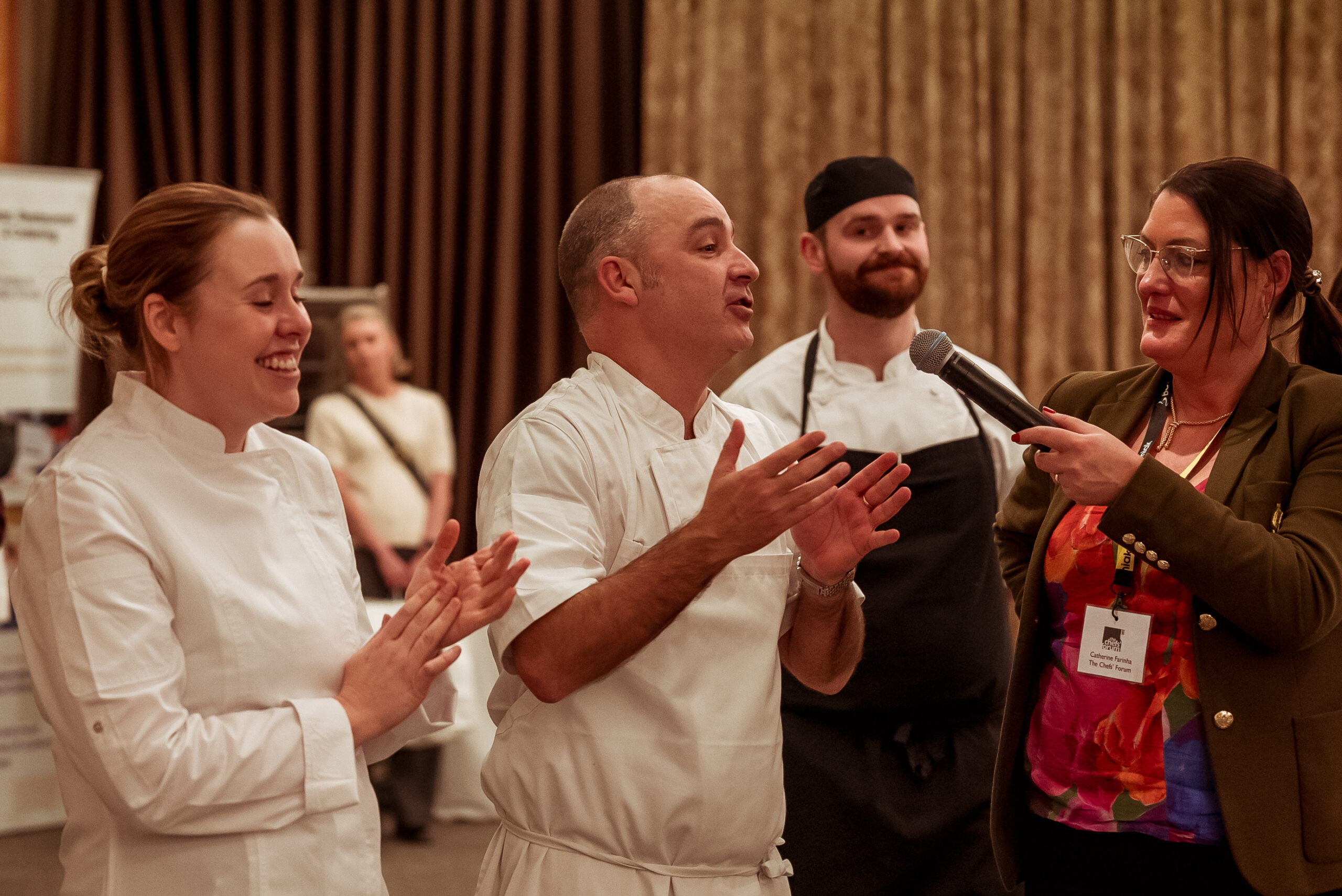 John Serhal shared, “We were thrilled to support and mentor these young chefs, and we were impressed by their skills and enthusiasm. We look forward to following their careers and perhaps one day welcoming them to the Royal Garden Hotel.”
John Serhal shared, “We were thrilled to support and mentor these young chefs, and we were impressed by their skills and enthusiasm. We look forward to following their careers and perhaps one day welcoming them to the Royal Garden Hotel.”
John and Connor joined forces to cook an Aussie beef rib main, which Emma Boughen from Meat & Livestock Australia presented to the room, she said “It is always so amazing to see all of the wonderful dishes the chefs create with Australian beef and today’s main was no exception. I really am so grateful to John and Connor for creating this wonderful seasonal dish and mentoring the students today – It is all so impressive and the quality of food being produced their mentorship of the students is truly outstanding.”
Shelly McLean , Event Manager at Royal Garden Hotel, added, “Events like these are invaluable in providing young people with a real insight into the hospitality sector. It’s a fantastic way to help them build confidence in the kitchen and front of house.”
Catherine Farinha, Director of The Chefs’ Forum, said, “This event has been one of the best we’ve organised, kicking off an incredible year of regional Chefs’ Lunches. The quality of food and the opportunities for the local students to work with top chefs were exceptional.”
Harmony, a Level 1 student at West London College, who was named back-of-house star of the day, said, “This was my first time working at a Chefs’ Forum event. Working with such skilled chefs and gaining valuable experience was an honour. I can’t wait to use The Chefs’ Knowledge throughout my career.”
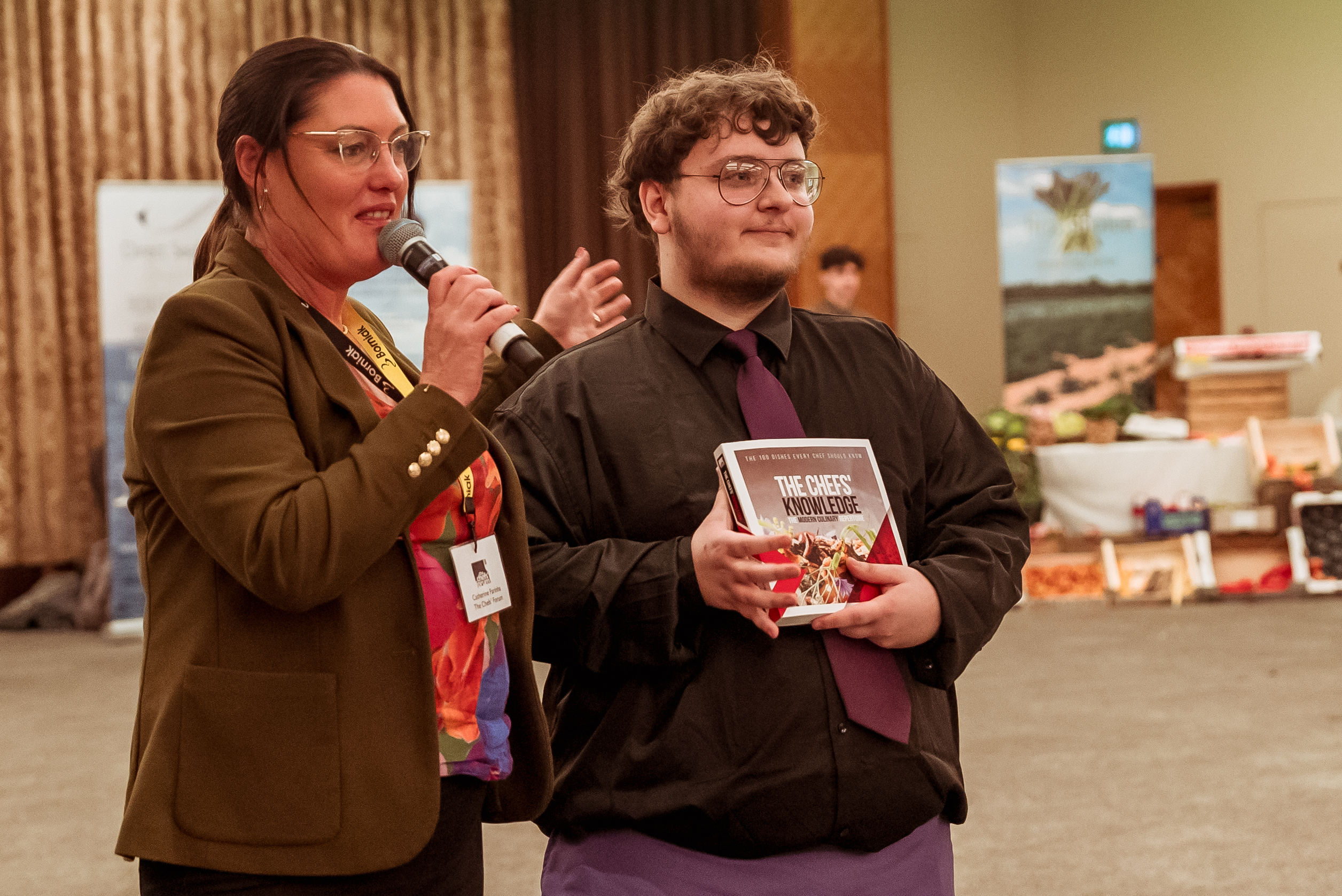 Oskar Orzol, a Level 1 student at West London, who won front-of-house star of the day, said, “It felt great to work in a professional environment. The atmosphere was warm and welcoming, and I learned so much while feeling at ease.”
Oskar Orzol, a Level 1 student at West London, who won front-of-house star of the day, said, “It felt great to work in a professional environment. The atmosphere was warm and welcoming, and I learned so much while feeling at ease.”
The event was made possible by the generous support of sponsors: MCS Technical Products, Aussie Beef & Lamb, Chef Works, Borniak, Tokyo College of Sushi & Washoku, Brown Brothers, HRC, Cooks&Co, Big K, First Choice Produce, Direct Seafoods London and Pastry Gelato Equipment.
The Roux Scholarship Announces its 18 Regional Finalists for the 2025 Competition
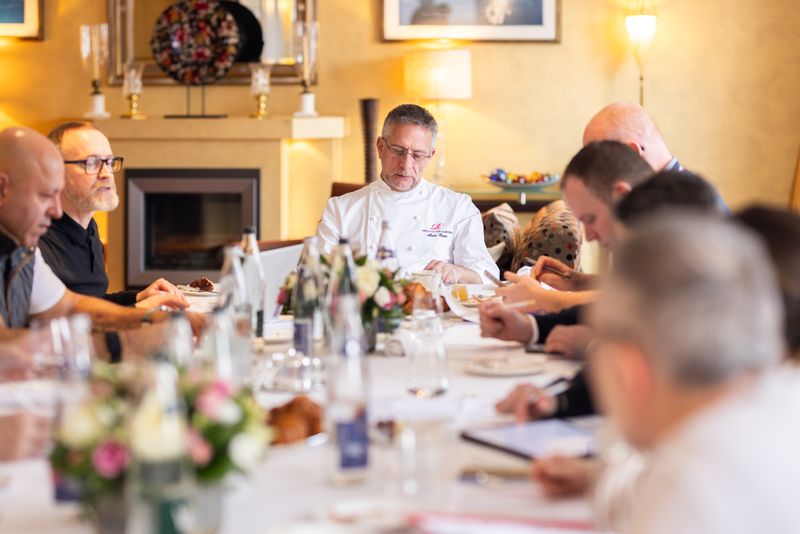 The Roux Family are delighted to reveal the names of the 18 chefs who will take part in the regional finals for The Roux Scholarship 2025. This year, 14 of the 18 finalists are new to the competition and they hail from establishments as far afield as Scotland and Devon.
The Roux Family are delighted to reveal the names of the 18 chefs who will take part in the regional finals for The Roux Scholarship 2025. This year, 14 of the 18 finalists are new to the competition and they hail from establishments as far afield as Scotland and Devon.
The 18 chefs, and two reserves, were selected from their written recipes that had to use two gurnard fish, mussels, dulse seaweed and parsnips. They were submitted anonymously to the judges, who took part in the Recipe Judging day at The Waterside Inn on 19th February 2025. The 18 finalists will compete in two regional finals which will be held simultaneously on Thursday 6th March 2025 at University College Birmingham and University of West London, Ealing.
Recipe challenge
For the recipe application, Roux Scholarship 2025 applicants were invited to create a recipe for four people using two whole dayboat Cornish red gurnards each weighing 700g – 900g (maximum 1kg); 600g live St. Austell deep sea mussels; fresh (or dried) red dulse seaweed, together with two simple or composed garnishes/accompaniments, one including parsnip. A sauce had to accompany the dish. The regional finalists will have 2.5hrs to cook their dish, along with a dessert devised and prepared from a mystery box of ingredients given to them on the day. The judges will be looking for recipes and methods, which demonstrate the best balance of creativity, taste, style and practicality in the finished dishes.
THE CHEFS COMPETING IN LONDON:
- Katherine Altham Hélène Darroze at The Connaught, London
- Liam Anderson Midsummer House, Cambridge
- Swann Auffray The Little Chartroom, Edinburgh
- Craig Johnstone Angler Restaurant, London
- Lachlan Maddigan Restaurant Gordon Ramsay, London
- Liam Pride Fancetts, Cambridge
- Darryl Shotlander The Dysart Petersham, Surrey
- Monty Stonehewer Whatley Manor, Wiltshire
- Nikoletta Theofylakidou Restaurant Associates, London
- Marnix Taghon Hide, London
- Rebecca Tough Vacherin, London
- Erin Yates Bar Valette, London
THE CHEFS COMPETING IN BIRMINGHAM:
- Fraser Cameron The Globe Inn, Dumfries & Galloway
- Charlie d’Lima Crocadon Farm, Cornwall
- Alan Hughes Gleneagles Hotel, Perthshire
- Harrison Miller Blundells School, Devon
- Oliver Robinson Coworth Park, Berkshire
- Tommy Thorn Puro, Bristol
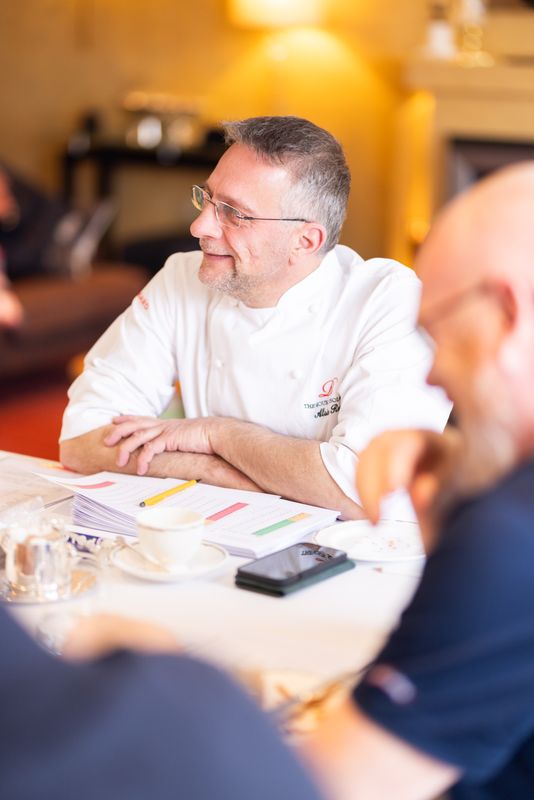 Judging in London: Alain Roux, Brian Turner CBE, Emily Roux, André Garrett MCA (2002 scholar), Adam Smith MCA (2012 scholar), Angela Hartnett OBE.
Judging in London: Alain Roux, Brian Turner CBE, Emily Roux, André Garrett MCA (2002 scholar), Adam Smith MCA (2012 scholar), Angela Hartnett OBE.
Judging in Birmingham: Michel Roux Jr, Sat Bains (1999 scholar), Simon Hulstone (2003 scholar), Rachel Humphrey.
There are two chefs in reserve (should any finalists not be able to compete):
- Kian Puerto-Terron The Painswick Hotel, Gloucestershire
- George Wintle Rochelle Canteen, London
QUOTES FROM THE JUDGES
Chairman Michel Roux Jr: “It is great to see so many different establishments represented across the country and to see chefs who have been supported to enter the competition by past winners, our Roux Scholars, and past finalists. There were some very inspiring recipes using affordable ingredients and lots of skilful, innovative techniques as well.”
Chairman Alain Roux: “It has been good to see how the different chefs used the key ingredients to come up with a wide range of dishes, with interesting flavours, drawing on influences from around the world. I can’t wait to see them cooking the dishes in the regional finals and indeed that is the skill we look for in the recipe application – chefs must write a recipe that we really want to taste.”
Emily Roux: “The regional finalists came up with a very eclectic mix of recipes; All sorts of different ingredients were used, spices, lots of Japanese flavours as well, which I thought was interesting. Gurnard is a fish that I love, we currently have it on the menu, so I was happy to see it in all its glory in different forms.”
Adam Smith MCA: “It’s great to see the process of recipe judging from the other side now I’m a judge. It’s been great to see the diversity of different cuisines and see those influences on what people are cooking and the different interpretations of the four different ingredients that had to be included.”
Simon Hulstone: “I think it’s really a real good mix from up and down the country, to be fair. There is a really good range of establishments: there are a couple of contract caterers in there, some really big- name restaurants, so it is really good to see that they’re supporting The Roux Scholarship. For me, it’s nice to see that there are new names coming through and new people are having a crack at entering.”
Key facts:
• The paper applications are judged blind, so judges do not know the applicants’ identity, place of work, or any other details other than the recipe.
• Four finalists have competed in the finals before: Charlie D’Lima (2024), Rebecca Tough (2024), Darryl Shotlander (2024) and Liam Pride (2022).
• There are four female chefs competing in the regional finals, three of whom are new to the competition. They are: Katherine Altham, Nikoletta Theofylaktidou, Rebecca Tough and Erin Yates. For more information on the White Paper titled ‘Women Chefs and The Roux Scholarship’ published in 2022, see https://www.rouxscholarship.co.uk/diversity-and-the-roux-scholarship/
• The finalists come from a wide range of establishments, such as a private school in Devon, a Scottish inn once frequented by poet Robert Burns, contract catering restaurants and three-star Michelin restaurants.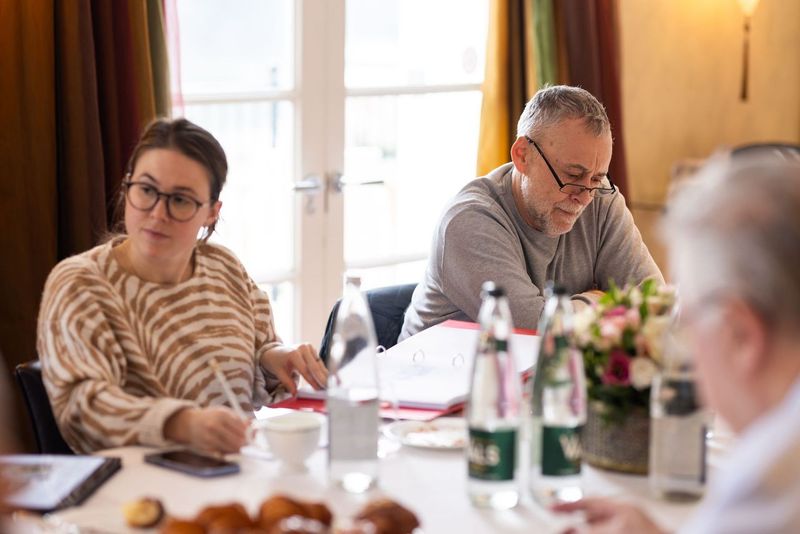
• The rules dictate that chefs must be resident in the UK, but their backgrounds are hugely diverse with finalists coming from Great Britain and countries such as Australia, France, Canada and Greece.
• As well as looking at how enticing the dish is and the best use of ingredients, the judges were looking at costings of the ingredients. They also looked at whether quantities listed and costings were accurate. In some cases, errors in costing lost the candidate points.
• The judging panel 2025 is: Alain Roux, Michel Roux Jr, Brian Turner CBE, Emily Roux, Clare Smyth MBE, Angela Hartnett OBE, Sat Bains (Roux Scholar 1999), Rachel Humphrey, James Martin, André Garrett MCA (Roux Scholar 2002), Simon Hulstone (Roux Scholar 2003) and Adam Smith (Roux Scholar 2012).
Photography credit Francesca Acosta
Semi-Finalists Announced for Student Pastry Chef of the Year 2025
 In an inspiring showcase of emerging talent, The Chefs’ Forum has announced the semi-finalists for the prestigious Student Pastry Chef of the Year 2025 competition. Now in its fifth year, this national event aims to address the ongoing shortage of skilled pastry chefs in the UK while celebrating the creativity and expertise of young pastry professionals from colleges nationwide.
In an inspiring showcase of emerging talent, The Chefs’ Forum has announced the semi-finalists for the prestigious Student Pastry Chef of the Year 2025 competition. Now in its fifth year, this national event aims to address the ongoing shortage of skilled pastry chefs in the UK while celebrating the creativity and expertise of young pastry professionals from colleges nationwide.
A Critical Industry Challenge
The hospitality industry has long struggled with a shortage of skilled chefs, particularly in the field of pastry. The impact of Brexit and the post-pandemic shift in the workforce has only exacerbated the issue. Pastry chefs play a crucial role in the kitchen, bringing a unique blend of science, precision, and artistry to their craft. Yet, the pipeline of new talent remains worryingly thin.
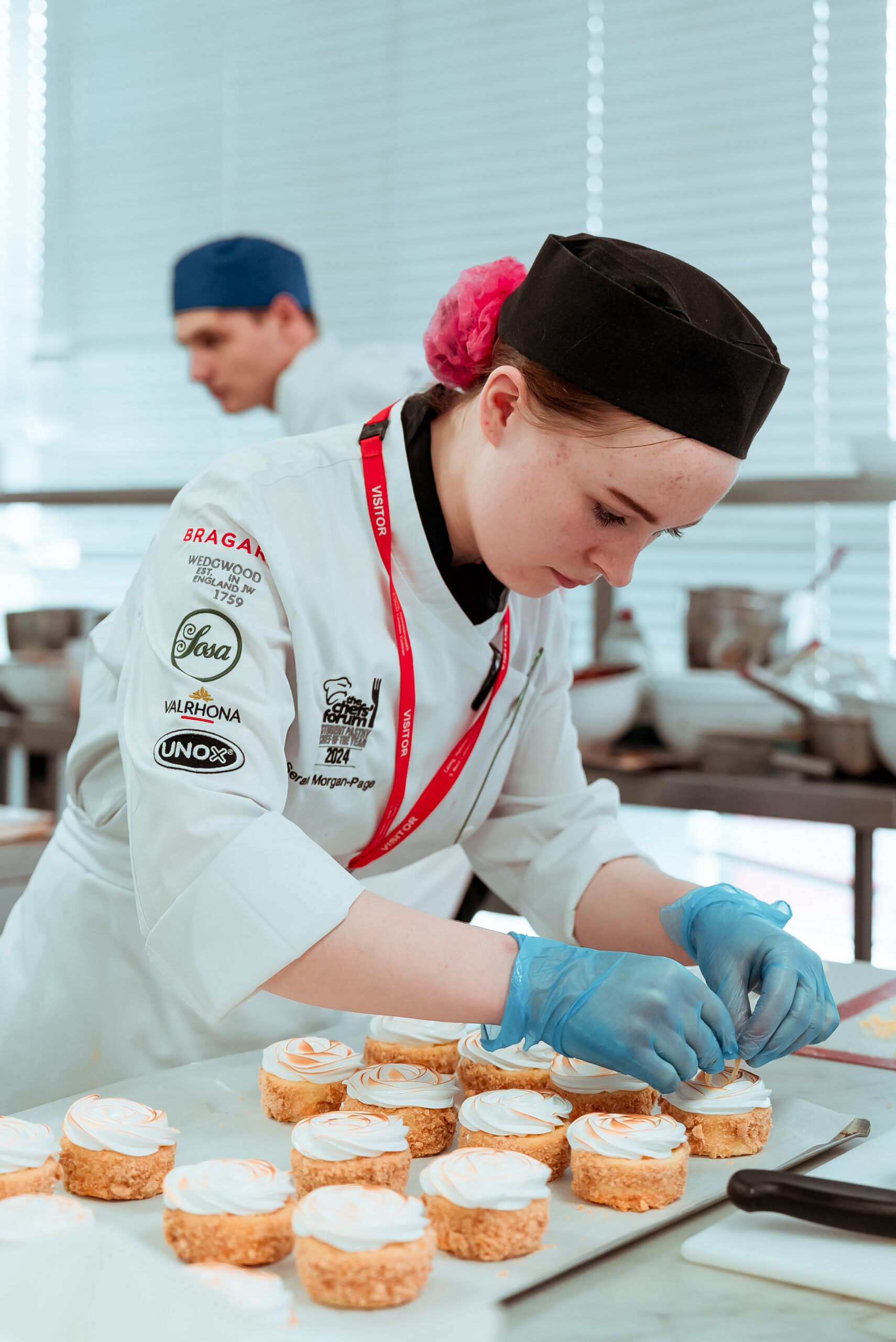 To combat this challenge and highlight the incredible training opportunities available in UK colleges, The Chefs’ Forum launched this national competition in 2020. The event not only identifies top talent but also provides young pastry chefs with the opportunity to showcase their skills in a high-profile setting.
To combat this challenge and highlight the incredible training opportunities available in UK colleges, The Chefs’ Forum launched this national competition in 2020. The event not only identifies top talent but also provides young pastry chefs with the opportunity to showcase their skills in a high-profile setting.
Meet the Semi-Finalists
After an intense first-round judging process, 22 talented students from colleges across the UK have been selected to compete in the semi-finals:
1. Abbie Williams – Coleg y Cymoedd
2. Alexa Seymour – Cornwall College
3. Bella McCue – Northampton College
4. Chloe Kirby – Leicester College
5. Daria Naumenko – North Herts College
6. Donna Chan – South and City College Birmingham
7. Elena Cutiac -Halesowen College
8. Eleri Davies – Coleg Y Drenewydd/Newtown College
9. Emily Carter -Leicester College
10. Tay Simpson-Rogers – Coleg y Cymoedd
11. George Walker – Bridgwater & Taunton College
12. Hanna Kravchuk – West London College
13. Jessica Sale – Loughborough College
14. Kiera Rakhrao – Loughborough College
15. Lucy Hammett – St Austell College (Cornwall College)
16. Millie Owen – Halesowen College
17. Paulina Litwin – West Suffolk College
18. Phoebe Mortimer – Cornwall College
19. Rukeeyah Ebanks – West London College
20. Sofia Bond – Westminster Kingsway
21. Toto Chin Wai To – Westminster Kingsway
22. Toucarra Blake – Northampton College
For the semi-finals, these students will take on the challenge of designing 7 x identical plated restaurant desserts and 2 x different petit fours.
Martin Chiffers, Joint Head Judge and International Pastry Consultant, expressed his excitement about the competition:
“After reviewing all the entries with my esteemed colleague Franciane Tartari, it was great to see that the level of each student’s work was so high. This is going to make for a very exciting semi-final. I’m really looking forward to seeing what the students come up with during this stage and selecting those who will go through to the final in May.”
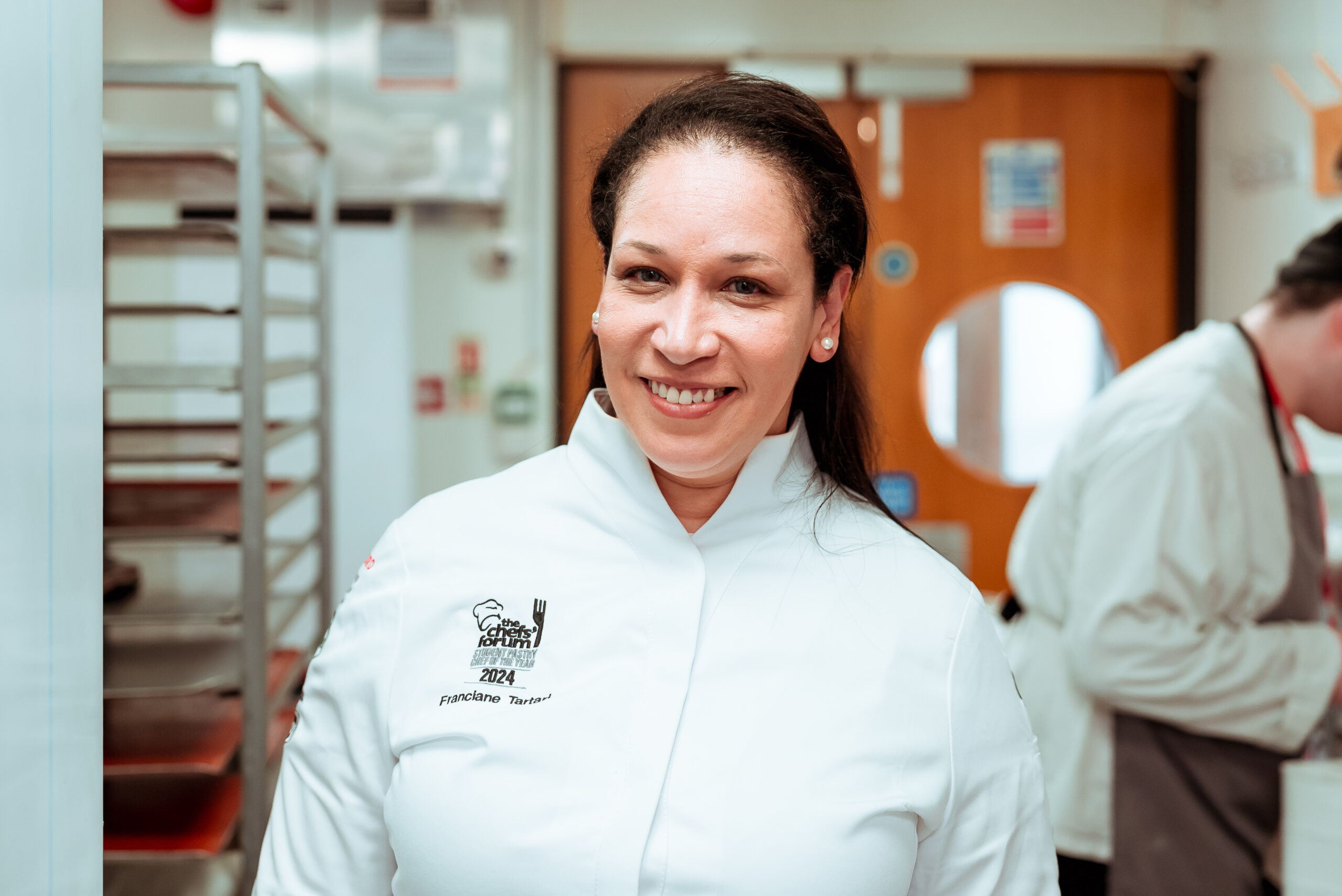 Franciane Tartari, Joint Head Judge, echoed these sentiments:
Franciane Tartari, Joint Head Judge, echoed these sentiments:
“It was fantastic to see a record number of entries and colleges enter the competition. We want the event to be accessible and fair to all students, so we designed the semi-final task with tight boundaries and a great scope for creativity. The standard is already very high, and I can’t wait to see who makes it to the final.”
What’s Next?
The semi-finalists must submit their designs by Friday 14th March at 17:00. Following this, the top eight finalists will be selected to compete in the grand final, which takes place live at West London College on Tuesday 13th May.
The finalists will face an esteemed panel of judges, including some of the UK’s most accomplished pastry professionals:
• Michael Kwan – Executive Pastry Chef at The Dorchester and UK Pastry Team
• Bobby Singer – Executive Pastry Chef at The Savoy Grill by Gordon Ramsay
• Michael D’Angelo – Executive Pastry Chef at Kensington Roof Garden
• Franciane Tartari – Pastry Chef Consultant
• Biju Joshwa – Executive Pastry Chef at Sheraton Grand Park Lane
• Rebecca Marshman – Group Head Pastry Chef at BaxterStorey
• Mohan Boddula – Group Executive Pastry Chef at Sexy Fish
• Nelson Sa – Freelance Executive Pastry Chef
• Miranda Reci – Freelance Pastry Chef
• Thibault Hauchard – Executive Pastry Chef at Claridge’s
• Benoit Blin – Executive Pastry Chef at Le Manoir aux Quat’Saisons/Bake Off: The Professionals Judge
• Mauro Di Lieto – Executive Pastry Chef & Bake Off: The Professionals Winner 2023
• Martin Chiffers – International Pastry Consultant
Sponsors confirmed so far: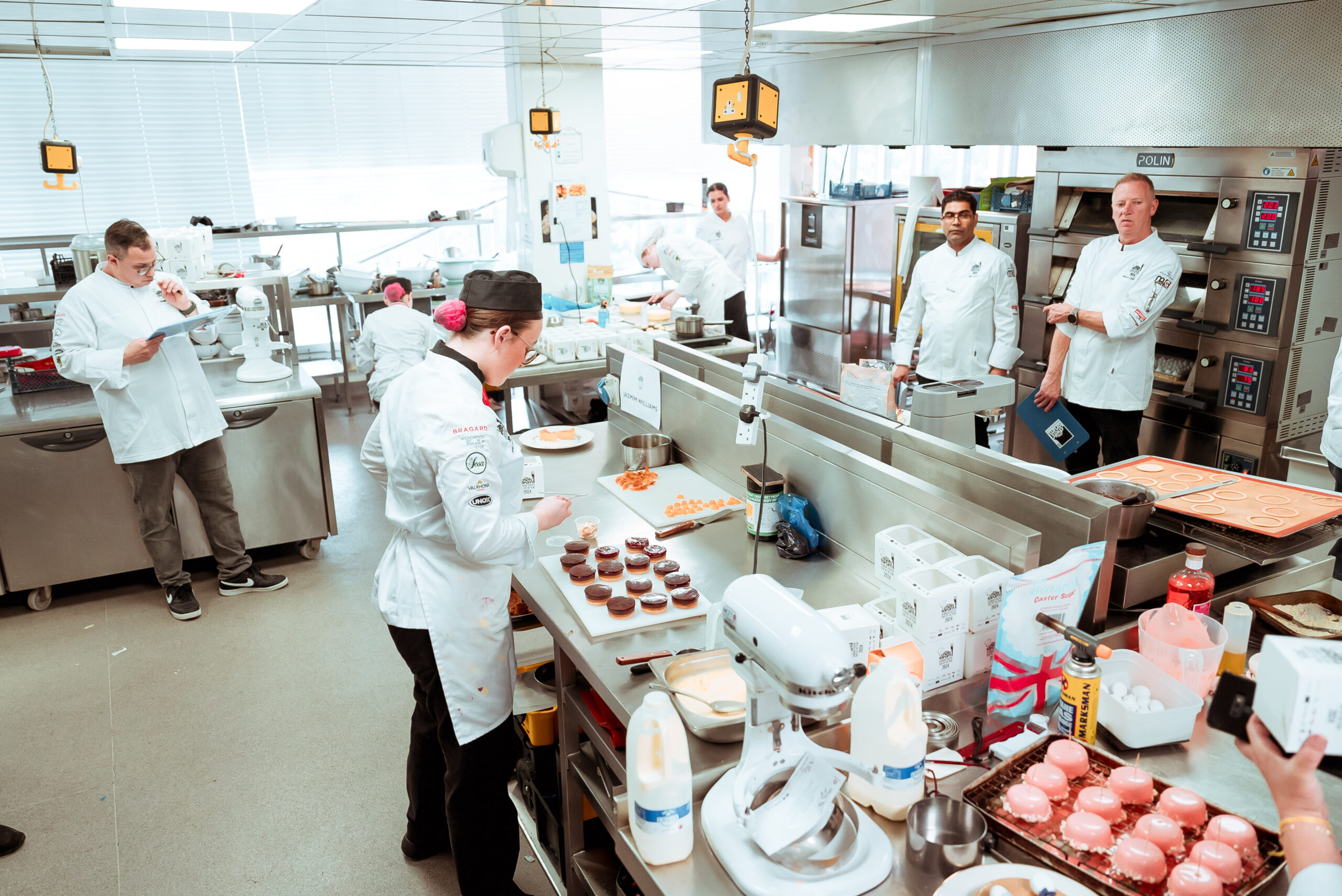
• Matfer Bourgeat
• First Choice
• Andros Chef
• Bragard
• MCS Technical Products
• Wedgwood
• Xoco
• Terra Firma
• Pastry Gelato Equipment
With such a high level of talent on display, the competition promises to be an exciting celebration of the next generation of pastry chefs. Stay tuned for the announcement of the final eight and, ultimately, the winner of the Student Pastry Chef of the Year 2025!
Let’s have a replay of last year’s final, won by Cecille Youngs of West Suffolk College:
Chef of the Week: Connor Godfrey, Executive Sous Chef at Royal Garden Hotel in London
How long have you worked at your current restaurant?
I have worked at the Royal Garden Hotel for 3 years.
Where did your passion for cooking come from and where did you learn your skills?
My dad is a chef, so I’m sure that’s where my passion started, being in and around the kitchen from a young age. I did a junior apprenticeship whilst still at college in year 10 and 11, so I was already going to University of West London.
What do you enjoy most about being a chef?
The people. I think so many people get into cooking for the love of food, and then it develops into the love of seeing people learning and growing in the kitchen and in themselves. I don’t cook a lot now but seeing the passion in people at work keeps me invested.
Name three ingredients you couldn’t cook without.
Butter, passion and enthusiasm – I appreciate two of them are not physical ingredients, but they are must haves for any good meal.
Which piece of kitchen equipment couldn’t you live without?
My watch. Timings are everything. When you’re dealing with some of the biggest sports teams in the world, everything has to run like clockwork.
What food trends are you spotting at the moment?
The lifecycle of food is always coming back around, the dishes that stand the test of time will always be trending.
What do you think is a common mistake that lets chefs down?
Panicking. We are cooking food, not doing open-heart surgery. Don’t place so much pressure on yourself.
What is your favourite time of year for food, and why?
All year! There are so many beautiful ingredients available all year round to get the taste buds pulsing.
Which of your dishes are you most proud of?
Over the last few years, watching the junior members of the team come up with new dishes and constantly raise their own bars is the thing I am most proud of.
How do you come up with new dishes?
Open discussions and collective information sharing.
Who was your greatest influence?
Being a chef is so much more than food; it’s about being a leader of people. I am reading ‘Leaders Eat Last’ at the moment. A very good book, to get the most from people and lead from the front to influence others.
Who do you think are the chefs to watch over the next few months?
Erin Jackson Yates, a chef who I used to work with. She is coming back to the UK on a new venture after being away in Australia working for Joshua Niland. She is a great chef, and this is a really exciting opportunity for her.
What’s been your favourite new restaurant opening of the last year?
It isn’t open yet, but Erin Jackson Yates is opening a new restaurant for Isaac McHale called Barvalatte, I’m looking forward to that.
The NACC Care Chef of the Year Competition Celebrates its Silver Jubilee
 The National Association of Care Catering (NACC) will be celebrating the 25th Anniversary of their prestigious Care Catering Chef of the Year competition in 2025.
The National Association of Care Catering (NACC) will be celebrating the 25th Anniversary of their prestigious Care Catering Chef of the Year competition in 2025.
The 25th Anniversary celebrations will be launched at an event hosted at the House of Lords, 6th February, where the current Chef of the Year, Samuel Sewell of Wellington Vale Care Home, Waterlooville will join previous winners and guests to give the 2025 competition a rousing start.
Building on the success of the 2024 competition that attracted record numbers of entries, the NACC is expecting the numbers to rise to even greater proportions for 2025. Care chefs working across the sector – from residential homes to community services such as meals on wheels – are invited to enter and showcase their specific skills and knowledge.
Catering for the care sector has never been so challenging or rewarding. With one million people over the age of 65 malnourished and the number of older people at risk of malnutrition even greater, chefs catering for older people in care homes and in the community have a duty of care to ensure the meals they produce are nutritionally beneficial and meet specific dietary requirements, as well as being appetising, appealing and delicious. Now in its silver jubilee year, the NACC’s Care Chef of the Year competition challenges all care chefs to do just that.
Entrants must create and substantiate a delicious and nutritionally balanced two-course menu, main and dessert, suitable for service users in a care setting. The combined food cost for both courses is also to be no more than £4.50 per head based on three portions, reflecting the restricted budgets care chefs often have to maximise.
The competition raises the profile of the care catering sector and champions the dedication, flair and skillset required of those working within it to continually raise standards.
To mark the anniversary, a new website dedicated to the Care Chef of the Year competition will be launched at the event.
Entries will be welcomed from mid-February, with the Regional Heats taking place in June and July, alongside the Regional Summer Seminars (dates and venues to be confirmed). This year will see the introduction of a new online entry platform, streamlining the experience for chefs and judges.
Speaking before the event, Neel Radia, National Chair of the NACC said, “The NACC Care Chef of the Year competition, has become a well-respected, established annual event, which showcases the immense skills and creativity by chefs across the care industry. For the NACC Care Chef competition to reach the milestone of 25 years is testament to the value the competition is held at across the industry. We encourage all chefs working across the Care Sector to enter this year’s milestone 25-year competition.”
Steve Munkley, Lead Judge for the competition said: “To have maintained a competition over so many years is a testament to the Association and what it stands for. Since I have been involved with the competition, I have seen a growing interest in the number of entries and certainly the standards delivered in the regional heats have been very encouraging. This sector certainly has some talented chefs.”
The NACC is delighted to confirm that Unilever Food Solutions will, once again, be the Headline Sponsors along with their longstanding event sponsor, the Worshipful Company of Cooks. In conjunction with the exciting new plans for 2025, we see new sponsors on board for the competition, including crockery sponsor, Foodcare Systems, small equipment sponsor, Metcalfe Catering Equipment, heavy equipment sponsor, Rational UK. and hygiene sponsors Blueleaf Care.
For more information on the NACC Care Chef of the Year 2025 competition and to register your interest in entering click here
Chef of the Week: Sean Simmonds, Culinary Director at Graysons
How long have you worked at your current restaurant?
I have worked for Graysons for just over 3 years, starting as executive chef for the business before being promoted to culinary director.
Where did your passion for cooking come from and where did you learn your skills?
I always enjoyed cooking with my mum when I was younger. I had a friend that had just started an apprenticeship in cooking, and this interested me. I left school at 16 and started my career path with a 4-year working apprenticeship in Melbourne, Australia. This helped me work my way up from the local pub into restaurants, then onto fine dining in some of the large five-star hotels in Melbourne.
What do you enjoy most about being a chef?
No two days are the same being a chef. I love the continual changes and evolution of the food scene – working with amazing and creative chefs and giving back to the trade by training the up-and-coming chefs, the future of the industry.
Name three ingredients you couldn’t cook without.
• Maldon sea salt
• Butter
• Freshly cracked pepper
Which piece of kitchen equipment couldn’t you live without?
My knives, they are always with me – primed and ready to deliver their next amazing dish.
What food trends are you spotting at the moment?
I am always blown away by the constant changing street food scene. Just when you think somethings getting old, a new and innovating stall appears. I like walking through Borough Market, Box Park and White Street. If you don’t like the lovely London weather, there are some great indoor food markets like Banana Warehouse/Cucumber Alley and the market halls located all around London. I’ve always got some time for a bavette steak and some triple cheese mac from Stakehaus.
What do you think is a common mistake that lets chefs down?
Over complicating of dishes and cooking out of season.
What is your favourite time of year for food, and why?
The colder months are some of my favourite times. Slow braising and deep rich sauces, roasted root veg, brassica with lardons and caramelised onions. However, a beautiful spring lamb shoulder on the BBQ is also close to my heart as well! When the produce is at its best and at its prime, this is always the best time for a chef.
Which of your dishes are you most proud of?
I am proud of a lot of dishes over my 30 years in kitchens. The one that stands out the most is when I was working at a gastropub near Chelsea Harbour, we were awarded the Time Out Gastro Pub of the Year and within the article it was stated that my sticky toffee pudding was the best in London!
How do you come up with new dishes?
I find that I’m always keeping an open mind and watching what our teams are producing, as well as street food stalls, dinners out etc. I look at what people want to eat and make it the best I can with a personal Aussie twist!
Who was your greatest influence?
I had a couple of influences early on in my career who were my college lecturers. I was lucky to have chef instructors that had been trained and worked in Europe before moving to Australia to train in my college. This lit a fire in me to absorb as many skills as possible and move through as many areas of the culinary world, before moving to the UK to continue to grow as a chef and food lover.
Tell us three chefs you admire.
Early on I was inspired by Charlie Trotter, with his use of essences and powerful gels to enhance simple ingredients. Anthony Bourdain, just for his rawness and exposing the reality of what happens in a kitchen and what a brigade is made of and needs to succeed. Later, his food travel shows where he would trace dishes back to their roots even if it was in a country at war or the middle of nowhere. Yotam Ottolenghi played a part in my mindset of cooking over the last few years. The way he works with amazing produce, only using a few simple ingredients to showcase the flavour, colours and textures of the humblest base ingredients and makes them shine through.
What is your favourite cookbook?
I always use us ‘Larousse Gastronomique’ as a base line and Michel Roux ‘Desserts: A Lifelong Passion’
Who do you think are the chefs to watch over the next few months?
Overseeing many hospitality sectors within my role, I work with chefs in B&I, restaurants, retail and customer attractions. I see talent and potential in many individuals across Graysons and the wider hospitality community.
What’s been your favourite new restaurant opening of the last year?
I have been waiting for Adam Simmonds to open Voyage this year, I am interested in seeing Adam bring his passion into London. Also following the sandwich revolution at Sandwich Sandwich, their egg mayo and Italian chicken are outstanding.
Healthcare Chefs Unite to Tackle Food Waste at Eating The Rainbow Workshop in Weston-super-Mare
 The latest “Eating The Rainbow” workshop took place at Foodworks in Weston-super-Mare this week, bringing together NHS Chefs, Catering Managers and Sustainability Leads. This vital session focused on food waste in healthcare, exploring innovative ways to manage and reduce it while ensuring nutritious, sustainable meals for patients.
The latest “Eating The Rainbow” workshop took place at Foodworks in Weston-super-Mare this week, bringing together NHS Chefs, Catering Managers and Sustainability Leads. This vital session focused on food waste in healthcare, exploring innovative ways to manage and reduce it while ensuring nutritious, sustainable meals for patients.
In partnership with NHS catering experts, The Chefs’ Forum continues its nationwide series of workshops aimed at shaping the second edition of The Healthcare Chefs’ Knowledge—a key resource tracking progress since the 2020 NHS Hospital Food Review. These interactive sessions provide healthcare chefs with a platform to collaborate, share best practices, and contribute to the ongoing evolution of hospital food service.
Philip Shelley, National Lead for Food (NZC) at NHS England, emphasised the importance of this initiative:
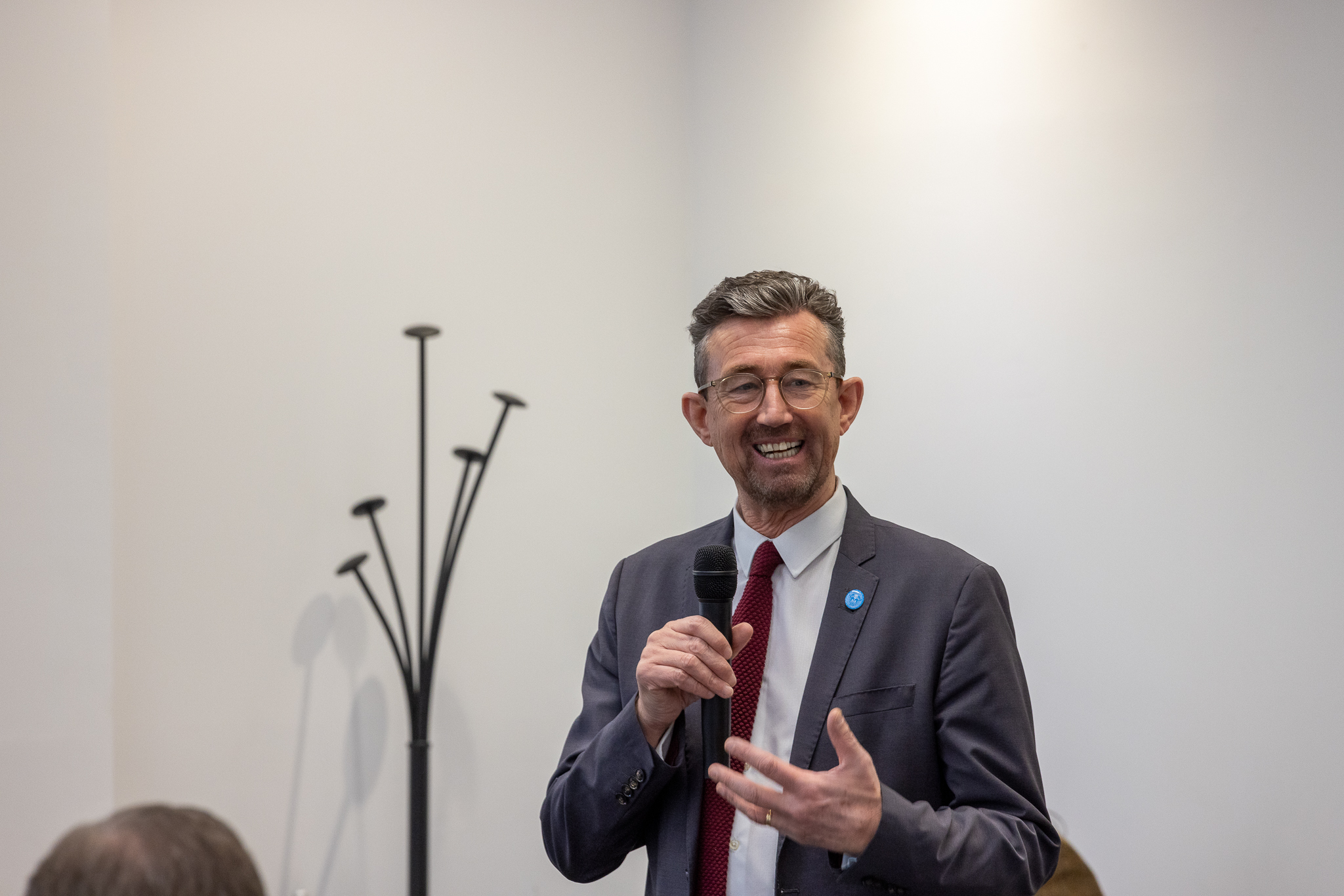 “The Healthcare Chefs’ Knowledge 2: Eating The Rainbow will provide critical insight into hospital food practices, with a clear focus on sustainability and waste reduction. This edition will be an essential tool for chefs and caterers, equipping them with strategies to minimise food waste while delivering high-quality, nutritious meals. We are delighted to partner with The Chefs’ Forum to showcase the fantastic work being done and continue to drive forward positive change in healthcare catering.”
“The Healthcare Chefs’ Knowledge 2: Eating The Rainbow will provide critical insight into hospital food practices, with a clear focus on sustainability and waste reduction. This edition will be an essential tool for chefs and caterers, equipping them with strategies to minimise food waste while delivering high-quality, nutritious meals. We are delighted to partner with The Chefs’ Forum to showcase the fantastic work being done and continue to drive forward positive change in healthcare catering.”
This edition will spotlight 100 carbon-conscious recipes designed to enhance sustainability and patient well-being. Additionally, it will explore practical waste management techniques that hospitals can implement to optimise resources and reduce their environmental footprint.
Kate Townsend, Sustainability Specialist at NHS England, highlighted the significance of the discussions:
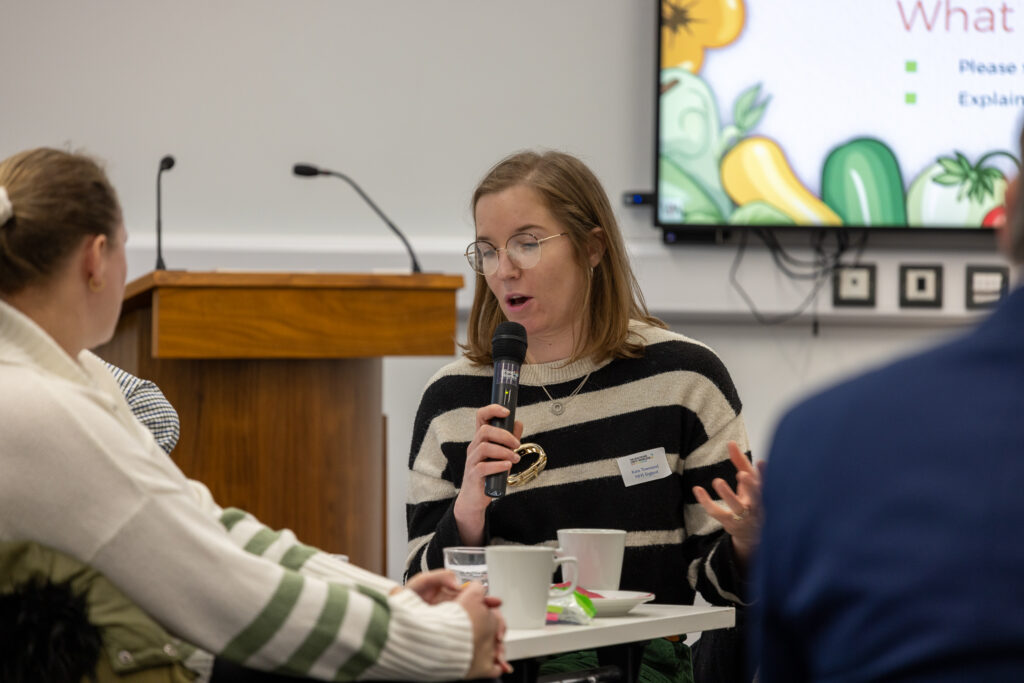 “These workshops allow us to bring together NHS chefs, suppliers, and sustainability experts to address key challenges such as food waste and cost efficiency. Food accounts for approximately 6% of our total carbon emissions in the NHS. It is estimated that the NHS disposes of approximately 14 million kilograms of unserved meals each year.. Promoting healthier menus and minimising food waste can help cut costs and carbon while improving the health of patients, staff, and visitors is a no-brainer! The conversations we’ve had today are incredibly valuable, providing practical solutions that can be applied across hospital kitchens, food supply chains, and catering services.”
“These workshops allow us to bring together NHS chefs, suppliers, and sustainability experts to address key challenges such as food waste and cost efficiency. Food accounts for approximately 6% of our total carbon emissions in the NHS. It is estimated that the NHS disposes of approximately 14 million kilograms of unserved meals each year.. Promoting healthier menus and minimising food waste can help cut costs and carbon while improving the health of patients, staff, and visitors is a no-brainer! The conversations we’ve had today are incredibly valuable, providing practical solutions that can be applied across hospital kitchens, food supply chains, and catering services.”
As one of five regional workshops led by The Chefs’ Forum, the Weston-super-Mare event underscored the South West NHS Trusts’ commitment to sustainability in healthcare catering. The workshop also provided a unique learning opportunity for culinary students at Foodworks, who had the chance to collaborate with NHS chefs, assisting in the preparation of sustainable, waste-conscious meals for the delegates in attendance.
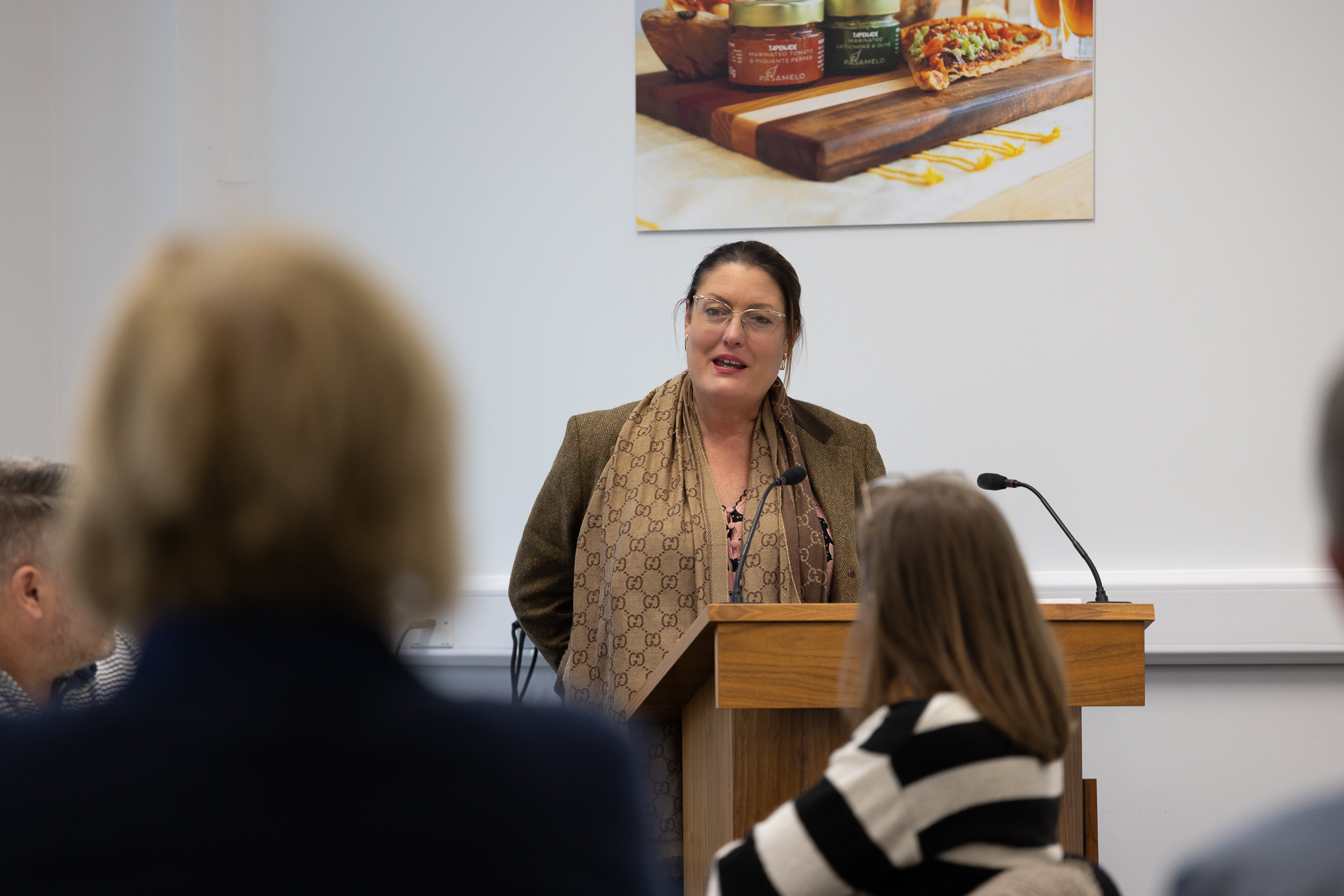 Catherine Farinha, The Healthcare Chefs’ Knowledge Publisher and Workshop Project Coordinator, reflected on the session’s impact:
Catherine Farinha, The Healthcare Chefs’ Knowledge Publisher and Workshop Project Coordinator, reflected on the session’s impact:
“This workshop was a fantastic opportunity to engage with NHS catering teams and witness firsthand the dedication to tackling food waste in healthcare and learn how we can collectively help craft more sustainable menus in hospital kitchens for patients. Staff and visitors. Seeing chefs and managers share their expertise and practical solutions was inspiring. This collaboration ensures that we reduce waste and create sustainable, cost-effective, and nutritionally balanced menus across the entire estate of 209 NHS Trusts.”
Mathieu Eke, Head of Facilities at Somerset Foundation Trust added:
 “Addressing food waste in hospital catering is a top priority. This workshop reinforced the importance of working together across the entire food value chain to minimise waste while maintaining high standards of nutrition. It was a great opportunity for me to share the strides we have made at Yeovil Hospital in installing refrigeration systems in our kitchens that can help heat water for the entire hospital. It’s encouraging to see chefs, catering managers, and suppliers united in finding solutions that support both patient care and environmental sustainability.”
“Addressing food waste in hospital catering is a top priority. This workshop reinforced the importance of working together across the entire food value chain to minimise waste while maintaining high standards of nutrition. It was a great opportunity for me to share the strides we have made at Yeovil Hospital in installing refrigeration systems in our kitchens that can help heat water for the entire hospital. It’s encouraging to see chefs, catering managers, and suppliers united in finding solutions that support both patient care and environmental sustainability.”
The Foodworks workshop supported the NHS’s broader sustainability goals and empowered the chefs Facilities and Catering Managers to innovate and share ‘best practice’ in healthcare catering. These workshops extend beyond recipe development—they drive systemic change to ensure that hospital food is both nourishing and environmentally responsible.
A highlight of the day was a delicious ‘Eat The Rainbow’ lunch prepared by the Foodworks Culinary Team, who prepared a variety of delicious, colourful and vibrant salads and sustainable proteins that demonstrated how sustainable practices can be seamlessly integrated into hospital menus. The Eating the Rainbow menu featured:
Carnival Quiche
Oven baked quiche with embedded peppers, red onion and cherry tomatoes
Herby Roasted Midi Potatoes
Mini roasted herb infused potatoes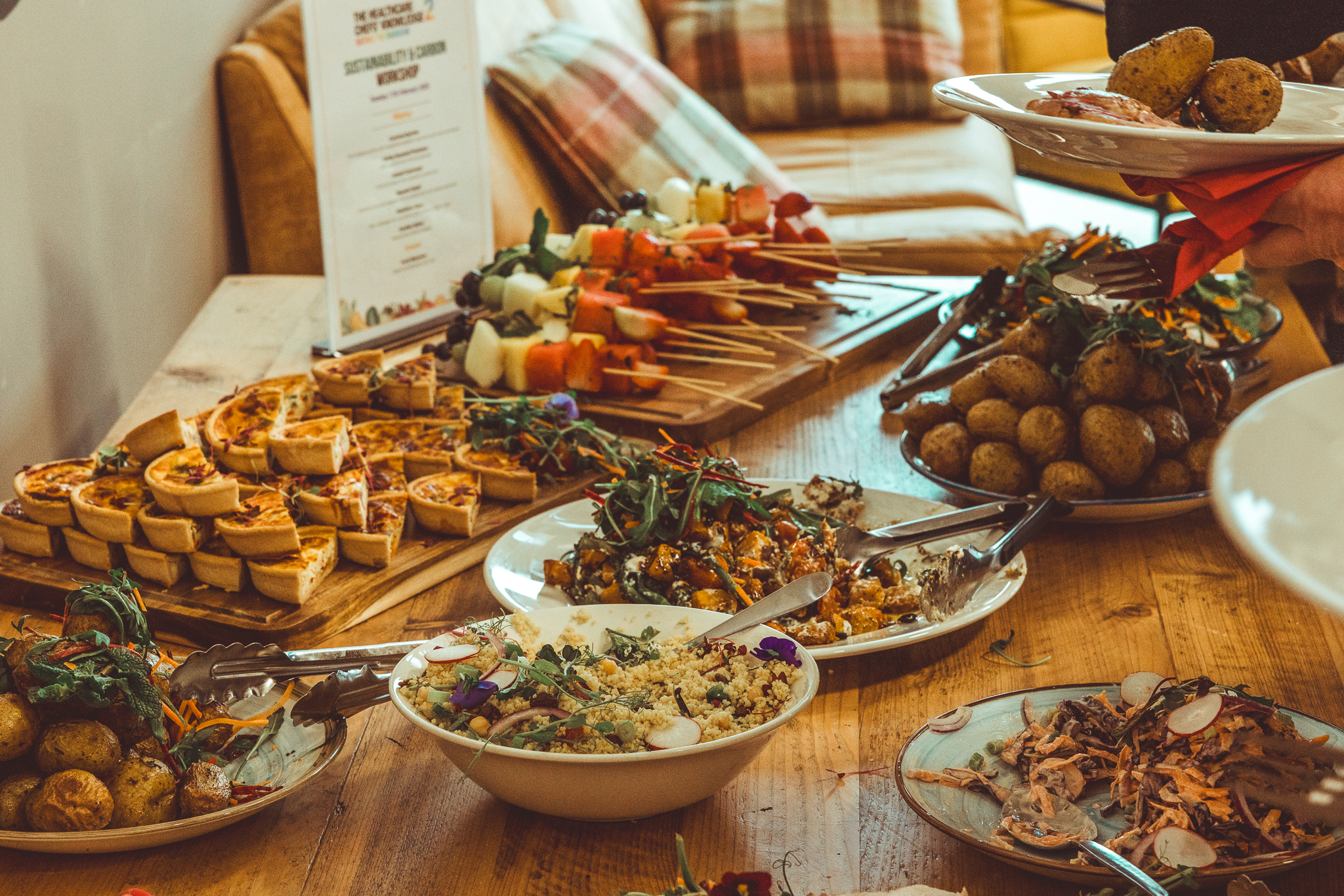
Glazed Gammon
Hand Sliced Gammon, glazed to perfection!
Squash Salad
Butternut Squash, topped with crumbled feta and roasted red onion
Rainbow Slaw
Raw cabbage mix, red onions, and carrot in a light mayo
Garden Salad
Mixed Leaf perfectly dressed
Fruit Skewers
Bright Fruit Skewers with mint
Philip Shelley concluded:
“By bringing together top NHS catering talent and sustainability experts, we are making real strides in transforming hospital food services. Engaging with students at Foodworks highlights the importance of education in this journey—we are shaping the future of healthcare catering by inspiring the next generation of chefs to prioritise sustainability and innovation.”
For more information on the upcoming book launch at Healthcare Catering Live on September 9th at the NEC, or to get involved in future sustainability-focused workshops across the UK—as a healthcare foodservice professional, sustainability lead, kitchen manager, dietitian, chef or supplier—please contact: catherine@redcherry.uk.com
Photography & film by Carlos Farinha




